
The Gospel in Bloom
Let’s Continue the Mission
The Real Thing
Did America Have a Christian Founding?
Money Matters!
The Difficulty and Responsibility of Voting in a Post-Christian America
Electing to Pray





















































The Gospel in Bloom
Let’s Continue the Mission
The Real Thing
Did America Have a Christian Founding?
Money Matters!
The Difficulty and Responsibility of Voting in a Post-Christian America
Electing to Pray



















































BY ERIC K. THOMSEN
I shook my head slowly as I backed down the drive of the gracious home in Hermitage, Tennessee.
Glancing over at the boxes of files stacked in the passenger’s seat, I muttered, “It just won’t be the same.”
For the first time in 51 years, Robert E. Picirilli is no longer a member of the Free Will Baptist Historical Commission. After stepping aside in July at age 92, he seemed quite content to pass along financial records and minutes to me. Seemed I was the one struggling with the transfer of paperwork.
Dr. Pic, as many of his friends and colleagues refer to him, was elected to his first term on the commission in 1973. To put that timeframe into perspective:
• Richard Nixon was President.
• The Vietnam War was winding down.
• The Watergate Scandal was about to explode into the public eye.
• The Sears Tower and the World Trade Center were completed.
• Secretariat won the Triple Crown.
• Loretta Lynn received top honors for “Coal Miner’s Daughter.”
• The Dow Jones industrial average broke 1,000 for the first time.
• Oh, and yours truly was about to smear birthday cake across his face at a first birthday party.
Fifty years is a long time, but Dr. Pic didn’t waste a second. Over the five following decades, he became the
cornerstone of the Historical Commission. He poured himself into acquiring, organizing, and cataloguing denominational historical materials. And he grew with the collection from commission member to chairman to curator.
The results of his efforts are phenomenal. Today, the Historical Collection holds hundreds of thousands of historical documents, books, and records. Dr. Pic also has been instrumental in researching and writing on Free Will Baptist history, from books and pamphlets to essays or the occasional personal letter to remind churches and clerks of the importance of preserving historical materials.
In recent years, Dr. Pic guided the commission through an expansion into the digital world. The resulting website, FWBHistory.com, has become one of the largest online repositories of doctrinal history for any denomination, let alone a denomination of comparable size.
Due to recent term limits adopted by the denomination, Dr. Picirilli will be the last quinquagenarian board member — that is, the last person to serve more than 50 consecutive years on a particular board. Somehow, the fact seems appropriate.
Perhaps this goes without saying, but the Historical Commission offers heart-felt appreciation to Robert E. Picirilli. The next time you see him, I hope you thank him as well.

About the Columnist: Eric K. Thomsen is managing editor of ONE Magazine. Email: eric@nafwb.org.
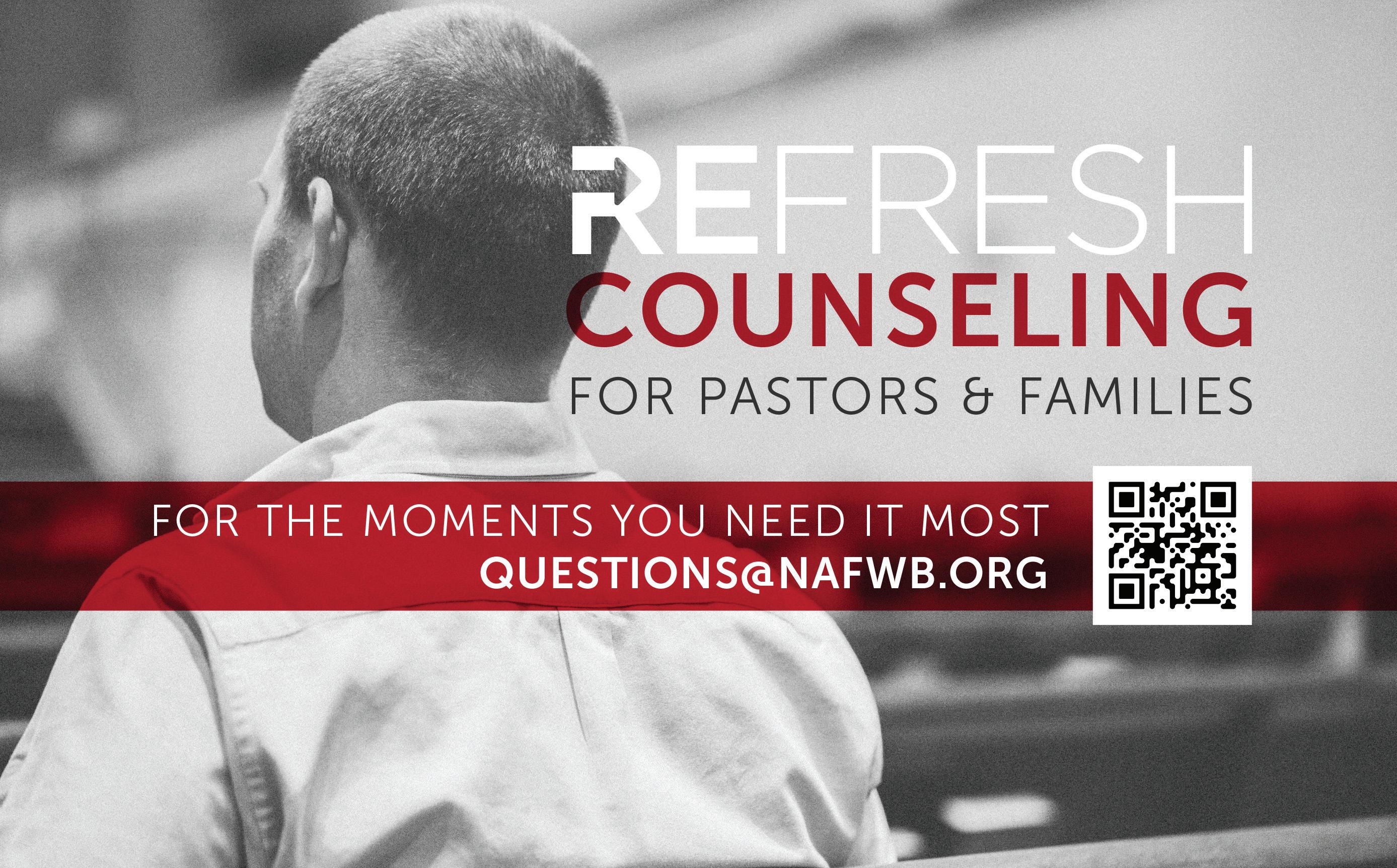
Nov 3
• God Knows What Is Ahead • Joshua 3:1–4:24
Nov 10 • Lessons From the Life of Rahab • Joshua 2:1–21
Nov 17 • Obedience Leads to Victory • Joshua 6




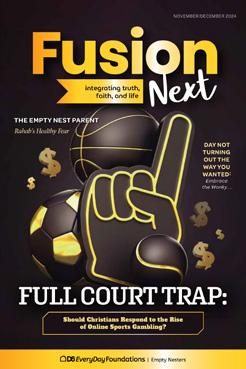

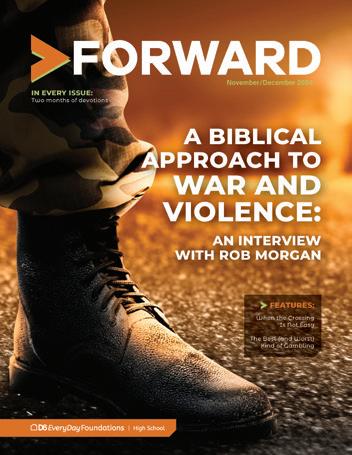
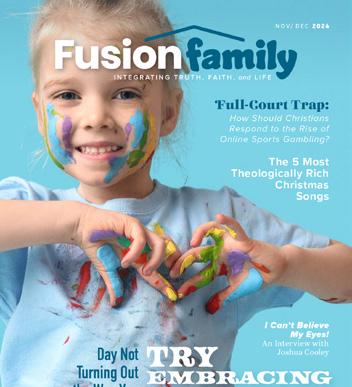
Nov 24 • Disobedience Leads to Defeat • Joshua 7
Dec 1 • Is Fighting Ever Right? • Genesis 14:1–24; Deuteronomy 9:4–5
Dec 8 • Preparing for the Messiah • Luke 1:5–24; 57–80
Dec 15 • Lessons From the Life of Mary • Luke 1:26–56; Matthew 1:18–25
Dec 22 • The Messiah Is Born • Luke 2
Dec 29 • The Problem With Gambling • 1 Timothy 6:9–10; Proverbs 28:19–20
To order, call 800-877-7030 or visit www.d6curriculum.com

BY JOSH HAMPTON
After moving to Missoula, Montana, to plant Summit FWB Church, I decided to run for my local community council. I never believed I would win one of the seven seats, but to my surprise, I won by a landslide! I settled into the new position, where I was the only pastor and the only Christian.
I arrived early one Tuesday evening before our monthly public town hall meeting. As I glanced over the agenda for the night, something jumped out at me. A new business was coming to our community, a recreational marijuana shop seeking approval to expand the size of its previously approved location. Due to proximity of other local businesses, they sought approval from the council. As I read the proposal, I thought, “I would hate to be one of those other business owners!”
One of the owners of this shop called Bloom was present at the meeting to make the case for expansion. When he presented plans to the council and community, he shared the proposed address, and said they would be next-door neighbors to Summit Church. Suddenly, I felt as though
all eyes in the room were on me. I am not sure if they were or not, but certainly I had the attention of my fellow council members.
The business owner continued his pitch, explaining how their business would “benefit the community,” how the shop would be “a valuable asset” to Missoula. The committee tabled the matter until our next meeting.
I drove home that night with my head spinning, struggling with whether to take a stand for our church and attempt to prevent this recreational marijuana shop from becoming our next-door neighbor. Throughout that month, our church planting team spent much time in prayer, earnestly seeking what God would have us do. After all, in Montana, the sale and use of recreational marijuana is legal. We asked ourselves, “Are we condoning the use of drugs by not standing up? What if someone got hurt by one of their customers who was high?” The “what ifs” went on and on.
One of the core values at Summit Church is “loving your neighbor.” As we prayed and sought God’s guidance, we
gradually became convicted. This situation reminded us we don’t always get to pick our neighbors, but we are still called to love them.
“Jesus said unto him, Thou shalt love the Lord thy God with all thy heart, and with all thy soul, and with all thy mind. This is the first and great commandment. And the second is like unto it, Thou shalt love thy neighbour as thyself. On these two commandments hang all the law and the prophets” (Mathew 22:37-40).
If we as Christians believe Jesus meant for us to love our neighbors, this was an (uncomfortable) opportunity to do just that. We decided not to stand in the way of Bloom’s proposal. We did not condone what they would be doing and selling, but we would not hinder their proposal.
Within a few months, Bloom was up and doing business next door to Summit Church. Those driving by our church on Sunday mornings passed two flags, each bearing crosses: one cross standing for the recreational drugs available at Bloom and the other in front of Summit Church, representing salvation for all of mankind. I remember thinking on multiple occasions, “What have we done?” Then, in a moment, everything changed.
One Sunday morning we had a first-time guest named David. He was a young man in his early thirties, and like most guests, he didn’t stick around long after the service. However, the following week, David was back! A volunteer informed me David had walked to church, and maybe we should offer him a ride home. I was surprised because no residential homes or apartments are located near Summit.

After church, I offered David a ride. He declined, saying he lived right by the church. Like many others in Montana, David declined to fill out a visitor’s card, so we knew little about him. Thankfully,
David attended a third Sunday. We began talking after church, and he started sharing his story.
David lived next door in an apartment above the business he co-owned. It was the perfect location, he told me, because he could simply walk to church every Sunday. Puzzled by this “business next door,” I asked David what business he owned.
Bloom. David was our next-door neighbor.
Over the next year, David gradually went from attending Sunday mornings only to attending small group Bible study and Thursday night men’s group. He began searching for answers and for his path forward in life. We learned David had accepted Christ at a young age but fell away from the church and the teachings of Christ. David continued to grow and mature in his walk with Christ, eventually rededicating his life to Christ, and October 8, 2023, David followed Christ in believer’s baptism.
Today, David has become one of the most faithful members of Summit Church where he regularly volunteers his time in the media room and on the worship team. He became convicted about using and selling recreational marijuana, and after rededicating his life to Christ, David sold his half of Bloom and went to work at a local body shop. Shortly after, the business closed its doors and dissolved.
David’s story is still being written, but it serves as a great reminder: Christ has called us to love our neighbors whoever and wherever they are. Our love for them may give us the opportunity to share the gospel and watch it bloom where it is planted.
About the Writer: Josh Hampton and his wife Kimberly are church planters at Summit FWB Church in Missoula, Montana. Josh, the son of partner church planters Clayton and Tammy Hampton, felt a strong calling from the Lord to plant a church in this widely unreached region. Together, the Hamptons and their team are making a tremendous gospel-impact in their community. Josh and Kimberly have two children, Taylor and Colton.

“I no longer feel lonely, because I now have the church, and there is always an open ear to listen and a loving heart who cares... I am so glad to be a part of this family.” — David
BY JOEL FRANKS
Years ago, I was blessed to take a mission trip to Altamira, Mexico. One memory from that trip is burned into my mind — an impoverished young woman who asked for help. My Spanish was limited to basic phrases, so I stood there unable to do anything about her pitiful situation. I left Mexico with a burden for Hispanic people. But with that burden came frustration, because I could not clearly communicate the gospel to them.
Over the years, that burden grew. As I prepared to move to Athens, Alabama, to plant Cultivate Free Will Baptist Church, I thought how wonderful it would be to have a multiethnic, multicultural congregation. I called bilingual friends and asked them about joining us, but none felt led to join our team.
After we arrived in Athens and got to know our new community, I was astounded by how many Spanish-speaking people I encountered each day. I began praying for someone to come help us reach this growing people group. God answered that prayer with the opportunity to bring Amilcar Castro and his family from Honduras to begin Cultivate’s Spanish ministry.
Excitement grew among the congregation as the launch of our Spanish ministry neared. They heard messages about the need for servants to help reach people, about how we are all one in Christ. Most of all, they heard constant reminders that love is a universal language. We are called to love our neighbors regardless of their language, ethnicity, or nationality.
This love for others was the key to God’s blessing upon our Spanish ministry.
American immigration debates often stir up feelings of resentment and anger, and, unfortunately, much of that bitterness is directed at immigrants themselves. But when new Hispanic people came through the doors at Cultivate, they were greeted with a warm smile and a firm handshake. Some were truly shocked to meet Americans who cared about them. They continued to come, and they brought as many as they could with them. Today, almost as many Spanish-speakers attend Cultivate Church as English!
Cultivate Church has worked hard to ensure we are one church. Many times, Spanish ministries take on the look of two congregations simply using the same building. This is not what God has called us to do. Scripture reminds us, “For as the body is one, and hath many members, and all the members of that one body, being many, are one body: so also is Christ. For by one Spirit are we all baptized into one body, whether we be Jews or Gentiles, whether we be bond or free; and have been all made to drink into one Spirit” (1 Corinthians 12:12-13).
Every Wednesday evening, we eat a potluck meal together. We don’t understand all the words we speak to one another, but we are sharing life. Before we break up into different classes, we sing praises to God together. Surely this is a small glimpse of Heaven where every tongue will gather to worship the Lamb with one voice. Perhaps the greatest blessing is seeing our children learning together. Once
We are called to love our neighbors regardless of their language, ethnicity, or nationality.
Hispanic children start school, they learn English very quickly. So, all the Cultivate Kids learn together in English. They will be the ones to demonstrate to the world we can get along with people different than us. They will demonstrate through their actions our unity in Christ.
There are difficulties with any ministry. The mixture of many cultures creates challenges. Each country has its own culture. Currently, people from at least eight nations attend Cultivate. Rather than argue about cultural practices, we have learned to appreciate our differences and to love one another despite them.

Perhaps the Lord has brought them to our town to learn of His love from Cultivate Church. We surely don’t want to miss that opportunity.
Recently, we noticed an influx of Haitian immigrants in our community. Several Spanish-speaking Haitians began attending our services. Shortly after they started coming, I met a Haitian man at my son’s school and struck up a conversation. I invited him to attend church, and when I did, his eyes lit up. He is the community coordinator for Haitians in our area, and he was hoping to start a church for Creole-speaking people. Now, we are searching for a pastor to come help us reach the nearly 2,000 Haitians who have moved to Athens and the surrounding area.
It’s hard to miss the challenges facing American immigration today as the news is filled constantly with stories. I cannot change that. However, rather than choosing to complain about the immigrants arriving, I choose to reach them with the gospel message. God is bringing the nations to us! Let’s show them the love of Christ and help them find a better life — new life in Jesus Christ.
About the Writer: Joel Franks is the lead church planter at Cultivate FWB Church in Athens, Alabama. He and his wife Melanie have three children: Jonathan, Makayla, and Ethan. Joel grew up in a church planting family and enjoyed a long, successful pastorate in Glasgow, Kentucky, before following God’s call to plant a church in Athens.
BY BRAD RANSOM
Having a team to support the pastor and assist with the work of ministry (Ephesians 4:12) is a win for any leader, and knowing your team’s personalities is even more helpful. Knowing your own personality as well as the personalities of your team helps in communication, accountability, conflict resolution, and more.
Although we don’t have space in this column to completely unpack every type of personality, we will look briefly at the DISC personality model so you can identify your personality type as well as the personalities of your team members.
Look through the circular chart and identify which list sounds most like you. You may display characteristics from more than one section, but try to identify your main personality type. Once you identify it, think about a particular team member. Try to identify which list sounds most like them.
Once you identify the main types, consider the following suggestions that may be helpful.
Communicate with other people according to their personality type. When communicating with a dominant personality type, it helps to speak up and get straight to the point. When dealing with inspirers, being lighthearted or even slightly sarcastic can get their attention. Speaking to a steady personality type is best in a nonconfrontational situation, with carefully selected and kind words. Conscientious personality types appreciate a reason, facts, and data to back up what you are asking.
If you communicate with others based on your own personality preferences, you are likely to have misunderstandings, offend, build walls, and hurt feelings (especially in a confrontational conversation or when dealing with conflict). Learning to communicate with people according to their personalities helps minimize these feelings and resolve conflict more easily.
Learn their pace and priorities. Dominant personalities tend to be fast-paced and task-oriented. Inspirers are usually fast-paced but people-oriented. Steady personalities lean toward a slower pace and are people-oriented, while conscientious types are slower-paced and task-oriented. Knowing these tendencies will help you understand others and how they get things done and react to them appropriately.
Understand directness and openness. Dominant types are usually direct when it comes to dealing with others but more guarded when
people confront them. Inspirers are also direct when approaching others, but they are more open when others approach them. Steady personality types tend to be more indirect in dealing with others but open when others deal with them. Conscientious types tend to be indirect and guarded.
Identify natural leadership style. When it comes to leadership style, each personality type handles things differently. Those with dominant personalities tend to lead with authority. They say things like, “This is what I think we need to do, and here is how we can do it.” Inspirers lead through relationships by saying, “This is what I feel like we need to do, and we can have fun doing it if we all pull together!” Steady types lead by consensus: “This is how I feel; what about everyone else?” Conscientious personalities lead by organization: “This is what I think, and here is all the data showing how we can accomplish it” (presented with a multi-page manual).
Every personality type has strengths and weaknesses. Every type needs to learn to accentuate strengths while minimizing weaknesses. When things are in harmony, leading according to our usual type is comfortable and preferred. However, during times of transition or difficulty, each personality type needs to lead according to what the situation requires. Dominants need to pull back and not charge ahead too forcefully. Inspirers need to be more serious and display confidence. Steady types need to write out their vision and present it without interruption, so more forceful personalities don’t talk over or around them. Conscientious types must learn not to bore others with too many facts and figures.
Adaptation is key in leadership.
One important word of caution: we should never use our personality type as an excuse for bad behavior or poor leadership. Although some personality types are more outspoken, we cannot run over other people less aggressive or outspoken. Dominants and inspirers may need to learn to dial it back, while steady and conscientious types may need to push themselves to speak up, especially when it comes to important matters.
There isn’t a right or wrong personality type. Every person is wired the way God created him or her. However, in certain situations, all personality types must learn to step beyond their comfort zones as necessary and adapt in making decisions, resolving conflict, and addressing situations.
About the Columnist: Dr. Brad Ransom is director of church planting and chief training officer for North American Ministries. Contact Brad: brad@nafwb.org.
Russell and Aileen Hylton and Greg and Stephanie Tucker have been approved as associate church planters with North American Ministries.
The Hyltons will serve at Ho’omana Church, a Free Will Baptist fellowship in Hilo, Hawaii, with lead planters Armon and Yvette Jorden. The Hyltons have two children, Cy and Aizha. Before ministering in Hawaii, the Hyltons served at West Side FWB Church in Sapulpa, Oklahoma, where Russell pastored. The Big Island of Hawaii is one of the most culturally diverse locations in the United States. Though this diversity encompasses various religious beliefs, Hawaii is increasingly secular, with more than half the population claiming no religious affiliation. The Hyltons’ love for Hawaii and passion for sharing the gospel drives them to serve sacrificially, bringing the good news and hope of Jesus to Hilo and its people.
Greg and Stephanie Tucker will serve at New Life FWB
The Lord blessed the Church Extension Loan Fund (CELF) in 2023 and thus far in 2024. As a result, investment rates are rising again by a half percent.
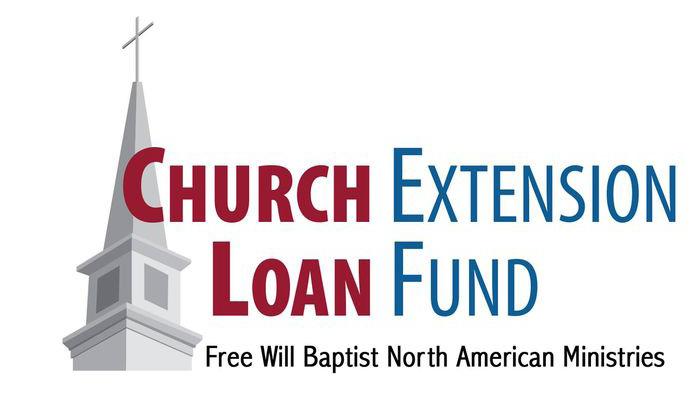
Beginning July 1, the new rate scale for CELF investments* is:
• 4.0% for $500-$24,999
• 4.5% for $25,000-$49,999
• 5.0% for $50,000-$99,999
• 5.5% for $100,000-$499,999
• 5.75% for $500,000-$999,999
• 6.0% for $1 million and up
Interested in investing? New investors are welcome. Contact us at 615-760-6137 or by email: nam@nafwb.org.
*CELF is not available in all states.
Church in Amory, Mississippi. The Tuckers will join lead church planters Chad and Paula Kivette as they work to revitalize New Life FWB Church, formally Amory First FWB Church. New Life Church exists to help people discover the “new life” that comes by putting their faith in Jesus Christ. The Tuckers, both Welch College alumni, have ministry experience in Michigan, Texas, and Arkansas where Greg most recently served as the pastor of Mt. Harmony FWB Church. At New Life, Greg’s ministry will primarily focus on discipleship, missions, and outreach efforts. The Tuckers have four children: Caden, Levi, Skyla, and Siana.
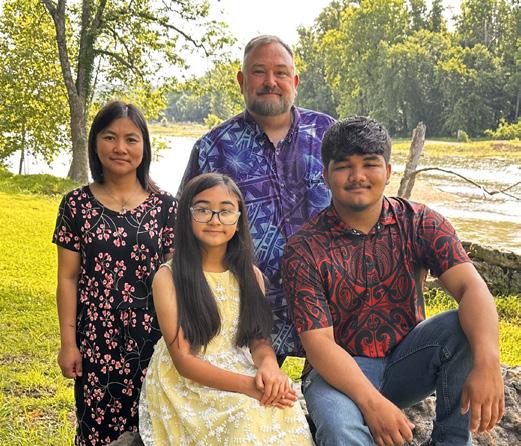

Congratulations to our newest Free Will Baptist U.S. Army chaplain, 1LT Jonathan Truett! CH Truett graduated from the Basic Officer Leader Course at the USA Institute of Religious Leadership in Fort Jackson, South Carolina, on August 16th. Truett is the son of Bethel Church Senior Pastor Chris Truett, and he graduated through the ROTC program at Vanderbilt University while attending Welch College. CH Truett and his wife Kendal will serve at Fort Bliss in El Paso, Texas, in the 1st Armor Division. Please join us in praying for this great couple and for the ministry before them.

North American Ministries is proud to serve as the endorsing agency for ministers pursing the chaplaincy. Whether through the military, in Veterans’ Affairs, at hospitals, or as first responders, our chaplains minister across the country in unique places.
Military chaplains serve as pastors to our service men and women and their families, ministering to personnel all over the world through Bible classes, chapel services, mentorship, and trainings. They are called to stand beside fellow soldiers and their families through sickness, celebration, tragedy, and war. We are grateful for their service to the Lord and to our country.
NAM currently has 15 chaplains faithfully serving across our nation. Please pray for the chaplains and their families (below) as they share the gospel with fellow men and women in uniform.
LTJG Josh Alderman, CHC – U.S. Navy, Guam
CH (1LT) Mason Anderson – Army National Guard, Republic, MO
CH (CPT) Amir Ashoori – U.S. Army Reserve, Fresno, CA
CH (CPT) Michael Beatty – U.S. Army, Fort Riley, KS
CH (1LT) Elliott Deilus – U.S. Army Reserve and Department of Veterans Affairs, Chester, VA
CH (CPT) David Dodson – U.S. Army, Eglin AFB, FL
CH Chris Dotson – Secret Service
CH (MAJ) Lee Frye – U.S. Army, Savannah, GA
CH (COL) Brad Hanna – Army National Guard, Edmond, OK
CH (CPT) Shaun Hembree – U.S. Army, Fort Campbell, KY
LT Hal Jones, CHC – U.S. Navy, Norfolk, VA
CH (LTC) Tracy Kerr – U.S. Army, Fort Liberty, NC
LCDR Mark McCraney, CHC – U.S. Navy
CH (MAJ) Kevin Trimble – Director for the School for Professional Development (USA-IRL)
CH (1LT) Jonathan Truett – U.S. Army, Fort Bliss, TX
Are you interested in serving as a chaplain? Contact Chaplain Support Officer Terry Austin (terry@nafwb.org) for more information about current opportunities and ministry requirements.


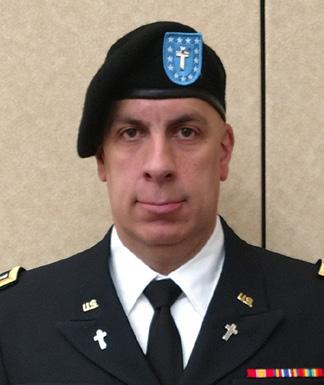

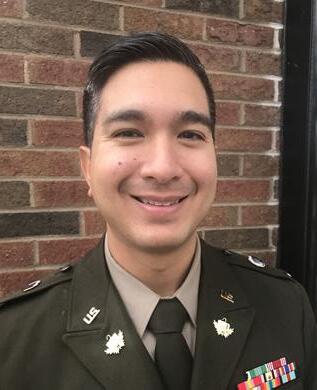
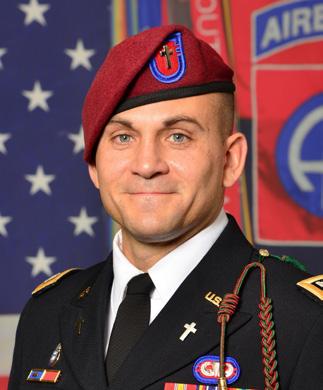
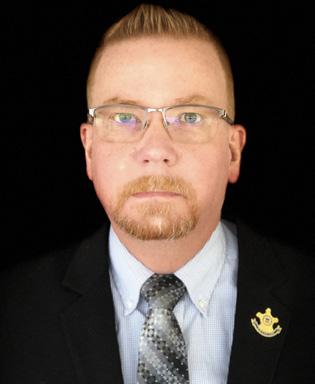
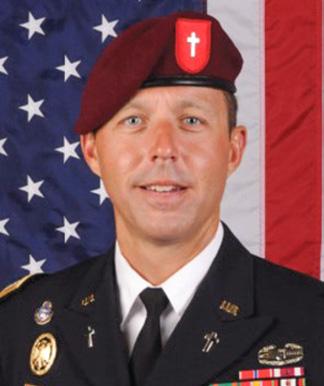

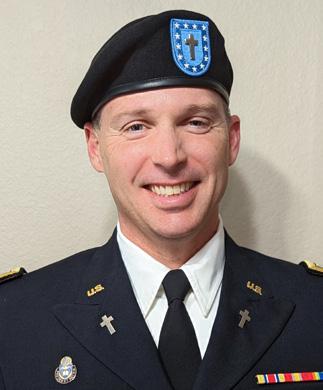
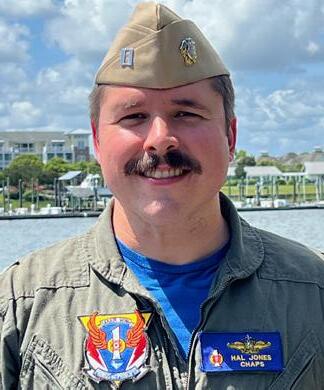




BY H. DAVID CROWE
For 86 years, the Home Missions Department has served our denomination by planting churches in North America, endorsing military chaplains, providing disaster response, promoting church growth and evangelism, preaching revivals, teaching seminars, planting cross-cultural churches, encouraging pastors and missionaries, and teaching about our wonderful heritage as Free Will Baptists.
For 28 of those 86 years, I’ve worked on the staff of Home Missions. I came to the department 28 years ago to help then-director Trymon Messer accomplish what God had called him to do through the department. I worked six years as the director of missionary assistance and visited 20 to 25 mission works each year, encouraging, educating, and equipping church planters. When Richard Atwood was hired, he filled my position, and I became the director of church growth. This role gave me the opportunity to visit 45 to 50 established churches each year for revivals, fellowship, encouragement, and public relations.
When Dr. Richard Adams retired six years later, I became the director of development, overseeing the Church Extension Loan Fund (CELF), as well as continuing my responsibilities as director of church growth. I served six years in that role as well. Then, December 1, 2013, I became the chief executive officer of the Home Missions department, which was then renamed Free Will Baptist North American Ministries. I’m now in my 28th year with NAM and my 11th year as CEO.
I reviewed my history with NAM because I want you to see how I came to this place and position. I have spent many hours and days researching our history as Free Will Baptists. After 25 years of studying our heritage, I believe I have a good perspective of where we’ve been as Free Will Baptists. I have criss-crossed our denomination for the last 28 years, crossing all the lines and boundaries in our
denomination as I’ve attempted to serve all Free Will Baptists, so I believe I have a pretty good perception of where we are as Free Will Baptists. Knowing where we have been and knowing where we are now helps us to know where we need to go.
So, where do we go from here?
I don’t pretend to know the direction our entire denomination needs to go, but I feel God has placed me at NAM and given me a vision of where our department needs to go.
Dr. Brad Ransom is director of church planting. He has graduate degrees in church planting and church revitalization. During his time at NAM, Brad has revised, updated, and upgraded all our church planting materials, along with the application and evaluation process for church planting candidates. He brought a new level of professionalism and expertise to that position.
Brad also put in place more individualized and regional training for church planters. We plan to get more churches planted and see more church plants become self-supporting sooner. We see our church plants have record numbers of people attend their launch services and record average attendances after they launch. If we can help church plants start stronger, we believe they can grow and thrive as self-sustaining churches with a solid foundation.
NAM has partnered with Dr. Eddie Moody and the Executive Office to promote church revitalization. It has bothered me for years that we have so many small, struggling churches that are not mission churches but still are not vital, self-supporting churches. Many of these churches close each year. We wanted to help these churches, so Brad Ransom, Ken Akers, and I have offered individual help, seminars, conferences, and programs to help revitalize these churches.
Retired Chaplain Terry Austin is our advisor for chaplain support. As the endorsing agency for Free Will Baptist military chaplains, we give our chaplains and their families the recognition and support they deserve as they minister to men and women in the armed forces. Chaplain Austin brings professionalism and a wealth of experience and knowledge, which provide a more effective plan of support for these “ministers in uniform.”
...help us as we begin the next 86 years?
...help us to have a record Mission North America Offering on November 24?
...partner with us as we partner with other departments, churches, and Free Will Baptist men and women across our denomination?
...join us and support us as we are involved in North American Ministries?
Rick Bowling directs Hispanic ministries for NAM. We presently have 54 Hispanic church plants with over 3,500 people meeting each week. Dr. Rufo Gomez will be starting churches for us across North America. Once they are started, we will match these churches with graduates from the Hispanic Institute as pastors. The Hispanic Bible Institute has already graduated over 300 students. This year, we relocated the institute from Oklahoma to Greenville, North Carolina, and named Indiana church planter Jaime Hernandez president. These men will work with Parkers Chapel FWB Church and Pastor Gene Williams to relaunch the institute and plant a new Hispanic church. This is one of the fastest growing ministries of NAM.
We believe we can get far more accomplished together than we ever could alone, so we will partner with other departments to do more for the glory of God.
We are partnering with IM, Inc. to reach international students attending colleges and universities in the United States. We are partnering with D6 and their YET team as they visit and minister in church plants. We are partnering with our colleges to provide students ten-week summer internships with church planters, thereby building a “pool” of future church planters for Free Will Baptists.
We are partnering with WNAC and Master’s Men for men and women’s ministries. We led the way for a merger between Master’s Men and NAM that brought Master’s Men under the umbrella of NAM. Master’s Men remains intact with all its present assets but ministers and operates under the direction of FWBNAM. This has enhanced the mission and ministry of both departments as we continue to expand the opportunities for men’s ministries in our churches and denomination.
Ken Akers has taken Master’s Men to a whole new level as he leads the way for Disaster Response Teams (DRT) in Louisiana, Florida, Texas, South Carolina, Kentucky, North Carolina, Mississippi, Puerto Rico, the U.S. Virgin Islands, and anywhere else disaster strikes our churches
Continued on page 41

BY RON HUNTER JR.
It was a popular Jewish delicatessen featuring breakfast and lunch items not found at other restaurants. While I was not looking for a kosher menu, I wanted something other than the run-of-the-mill burger. The deli offered an array of unique items including a delicious pastrami sandwich and matzo ball soup.
Since customer service was second to none, the restaurant did great business, but they encountered costs beyond their control. After decades of successfully serving customers, they were overwhelmed by rising healthcare costs and benefits for their employees. (You can only charge so much for soup and a sandwich.)
The size of the restaurant, the location, and other factors limited their growth. The owner had numerous successes and other restaurants, but in 2015, the Midtown Noshville Delicatessen closed its doors, and former customers desperately miss their irreplaceable entrées.
I thought about this deli as I pondered the future of D6 Family Ministry. Several thoughts ran through my mind: does a ministry like D6 Family (Randall House) need to trim its “menu” of services to survive this rapidly changing landscape? If yes, what do we cut? Would people miss us if we no longer existed? Do pastors not realize we have been an exception? That every other denominational publisher has collected donations for years?
These questions and many other concerns continuously run through my mind as I attempt to steward a valuable ministry that affects the identity of our movement. I wrestle with the most common misunderstanding about
non-profit ministries like ours — that we sell products but still need donations to offer all the services needed, especially for those who cannot afford them.
Our fundraising challenges stem from a small percentage who hold a forty-yearold belief that if we do not have an annual offering day, it indicates we neither need nor deserve financial support, and therefore should not start asking for contributions now.
People outside our denomination continue to be impressed by all D6 does for our people, missionaries, youth, church planters, chaplains, and the international community.
The last five years taught all of us we must adapt to new methods just to survive. Our pastors have truly adjusted in a post-pandemic world, and I am proud to say, without compromise. For nearly 70 years, Randall House (now D6 Family Ministry) has given back to our denomination without charging nearly enough to cover the costs. Every week, church planters have teachers open Free Will Baptist curriculum and teach their students to understand our doctrine and embrace a solid conservative view of Scripture. Deployed chaplains have access to books and Bible studies to teach and give to the troops. Young troops often desire The Brink Magazine or Fusion Family Magazine for their devotions. Most Free Will Baptists would rather give their congregations our devotional magazines instead of Our Daily Bread or Upper Room, which, though good, do not support our denomination or our teachings.
People eagerly support our colleges and missionaries who are very worthy of support, but forget that almost every missionary grew up on Randall House curriculum, went through our teen leadership program Truth & Peace, and studied and competed at our annual Church Training Service (CTS) where they memorized large portions of Scripture, learned stories, and developed musical and artistic talents. Missionaries (home and international) get to shop for books for their personal use without paying a single dollar all because people support our ministry. This past year, several missionaries came through and selected upward of $900 worth of books from our warehouse free of charge.
We are seeing generational discipleship reach thousands of churches worldwide teaching in ways no one else is doing! The D6 Podcast , which started eight years ago, now has over 400 episodes reaching countries around the world. Top Reads for Busy Leaders has thousands of subscribers, and they pay nothing for this weekly service.
Like the Noshville Deli, this D6 list of services offers a full menu for pastors, misisonaries, churches, and young people that is unmatched, but like the famous deli, is quickly becoming unsustainable. That is why we need your support. We don’t want to cut the “menu” of services we provide. Each plays a vital role in discipleship development and the carrying out of the Great Commission.
Thank you for trusting us for all these years, for enjoying our books, curriculum, CTS, Truth & Peace, YET, Top Reads for Busy Leaders, the D6 Podcast, and so much more.
Your purchase of church curriculum is the biggest blessing. When you provide your people with D6 devotional magazines, we both win because discipleship occurs every day, not just on Sundays. For those who have included us in your budget because you see us as the ministry we are, thank you.
More state ministries have included us in their annual budgets. Numerous individuals believe in what we do, understand their children benefited from one of our ministries, or see the obvious partnership between discipleship and missions. No matter the reason, more people have begun to recognize the value of and need to support D6 Family Ministry. Without a doubt, your support through one-time gifts is incredibly helpful, but through monthly support, you become a hero who enables us to continue making an impact around the globe.
Quite honestly, we must change the archaic and inaccurate mindset that suggests D6 Family Ministry (Randall House) is not a ministry. Other denominational publishers, AWANA, Christian colleges, the Salvation Army, and numerous ministry organizations sell products but also take in a large percentage of donor gifts to keep their ministries viable. Without those gifts they could not survive. That day has arrived for us as well.
We have been blessed for many decades to perform above the standards of non-profits, but the past five years have revealed some serious vulnerabilities. We need your help, no matter how small the gift you are able to provide. We simply ask that you begin today.
A monthly gift could mean this valuable ministry avoids the tragic fate of that famous deli. We offer the Bread of Life, not sandwiches. Will you join us today, pick one of our ministry categories, and provide financial support?
We will send you a monthly report and communicate with you. We do not take any gift for granted. If you love our menu and how we serve you, your kids, pastors, churches, and missionaries, then your gifts can ensure these services continue.
About the Writer: Ron Hunter Jr. has a Ph.D. in leadership and is CEO of D6 Family Ministry. You may contact him at ron.hunter@ d6family.com.

IM is quickly approaching 90 years of leading Free Will Baptists to labor with the Body of Christ to fulfill the Great Commission. Our 2024 theme is “Embracing the Legacy…Continuing the Mission.”
Embracing the Legacy means we acknowledge, value, and honor the people, traditions, and achievements from previous generations. We fully recognize the impact of our pioneer missionaries on today’s mission efforts.
Our legacy began in 1935 when the newly-established National Association of Free Will Baptists sent a single lady, Laura Belle Barnard, to India. Those early years saw other great pioneers, heroes of the faith, join the ranks. People like Pop and Mom Willey, Carlisle and Marie Hanna, Ken and Marvis Eagleton, Dr. and Mrs. LaVerne Miley, and many more stood tall and served faithfully — often at great personal sacrifice.
Many of our pioneers have gone to be with the Lord. However, their godly influence and impact extends beyond their active involvement in missions.
We have substantial evidence the subsequent generations are embracing the legacy and continuing the mission. Our statistics from 2023 reveal much spiritual seed has been “planted and watered.” God has certainly given the increase. We believe 2024 will bring an even greater harvest.
From the outset, new IM missionaries are taught the IM
BY CLINT MORGAN
mission statement: IM labors with the Body of Christ to fulfill the Great Commission. They are presented with six tasks directly focused on accomplishing this mission statement. It is vital to our existence and effectiveness for each one to commit to carrying out these six tasks.
Please allow me to review those six tasks and the results revealed in the 2023 field statistics. God is mightily at work!
1. Minister to people’s needs. This simply means to demonstrate God’s love for all people by meeting their real or felt needs. Our missionaries and partners engage in many creative ways to minister to needs. They use 155 ministry centers. These are not churches but locations where people’s felt needs are met. Ministry centers provide places for learning English, food distribution, addiction treatments, vocational training, computer classes, sports programs, etc.
In these centers, 54,737 people had needs met throughout the last year.
2. Share the gospel. We are called to share the transformational message of compassion and hope. Through the faithful witness of IM missionaries and national partners, 6,319 men, women, and children’s lives forever changed because they accepted Christ as Savior in 2023.
3. Disciple every new believer. Third, and perhaps most important, we commit ourselves to see every new believer discipled. This task, given by Christ Him-
self, is essential to seeing believers remain faithful and churches stay strong. One of the public demonstrations of one’s faith in Christ is to follow Him in baptism. In 2023, 2,732 baptisms bore witness to others of new commitments to Christ.
4. Plant churches. If the four previous tasks are carried out in a God-honoring manner, we believe Christ-centered, biblically-sound, and culturally relevant churches will emerge.
The year 2023 was exciting! Field workers saw:
• 49 new churches planted.
• 79 churches organized.
• 376 mission outreach locations established.
Our 2020-2025 goal was to increase the number of Free Will Baptist churches and mission works outside North America from 845 to 2,000. According to 2023 reports, we now have 1,130 churches overseas. We praise God for this amazing growth and sincerely believe we will reach the goal of 2,000 by the end of 2025.
5. Train leaders. It is imperative we focus on biblical qualifications as we train leaders. If they are to preach the truths of God’s Word, they must know these truths, believe them, and live them. In 2020, we set a five-year goal to see the number of Bible institutes increase from eight to 12 by the end of 2025. Today, 15 Bible institutes and training centers serve 499 students following various courses of study. Though this goal has been met, it does not erase the need for continued growth and establishing more training centers.
6. Partner with the Body of Christ. Our mission statement clearly indicates we are to “labor with the Body of Christ to fulfill the Great Commission.” We desire to plant Free Will Baptist churches that see themselves as a part of the greater Body of Christ. God has blessed IM with 28 partners. Through these efforts, we have some level of outreach in 41 countries. Every one of these partnerships has a Free Will Baptist connection.
Consider the cumulative results of what God has done
• 151 ministry centers met needs for 54,737 people
• 6,319 salvation decisions overseas
• 2,732 baptisms
• 1,130 churches overseas
• 49 new churches planted
• 79 churches organized
• 376 mission outreach locations established
• 155 Bible institutes and training centers served 499 students
• 28 partners extended outreach into 41 countries
• 57,417 — average Sunday attendance in FWB churches outside North America
through the faithful ministries of our field missionaries, national believers, and partners. Perhaps you recall IM set a goal to see the number of Free Will Baptist believers outside of North America grow from 35,537 in 2020 to 50,000 by the end of 2025. In God’s eyes, even that number was too small. This is evidenced by the astounding fact the average Sunday attendance in Free Will Baptist churches outside of North America in 2023 was 57,417.
That should bring joy to our hearts and a hallelujah to our lips!
The IM board challenged the IM leadership team to set new “impossible-to-reach” goals. That is, impossible to reach without a clear intervention of God. We like this kind of challenge. We prayed and asked God to give us some extreme goals for the next 10 years — goals we will strive to meet by the end of 2034.
For each goal we asked three questions:
• Where are we at the present time?
• What is the probability of this goal being realized?
• What is our plan of action or POA?
We are still working through the details, but we are well on our way to pursuing these new goals.
Please allow me to share the EXTREME GOALS we established.
1. See our individual donor list grow from 3,609 to 7,000. We believe many Free Will Baptists are not giving to IM mission efforts. We should note 7,000 is still a small percentage of Free Will Baptists, which number close to 120,000.
2. Have 225 board-approved missionaries. Currently, 113 missionaries labor on our fields. Our five-year goal aims to have 125 IM missionaries before the end of 2025. To reach the goal of 225 by the end of 2034, God will have to work in a miraculous way. We are assuredly anticipating Him to work and us to walk with each candidate from application to the field and through their years of service.
3. See IM meet three major financial goals. We all know IM ministries, programs, and people must be supported financially. As we strive to meet these needs, we have set the following goals.
• $1 million for the World Mission Offering (WMO). This annual offering averages $650,000.
• $3 million for the GROW ENDOWMENT. The GROW ENDOWMENT helps provide seed money for new missionaries.
• $10 million for the CORNERSTONE ENDOWMENT. This endowment’s purpose is to provide adequate income for the general fund.
4. Free Will Baptists share the gospel with one million people. We are commanded to take the gospel to the nations. To reach a million people with the gospel may seem impossible, but let’s remember, with our God, nothing is impossible.
5. Double the number of Free Will Baptist believers beyond North America. Presently, 118,123 Free Will Baptists worship weekly in North
America, and 57,417 gather outside of North America. This goal is unobtainable without God’s help and our obedience.
By valuing the legacy, establishing a solid foundation, and continuously working toward the mission with adaptability and empowerment, we can ensure the work of those who came before us endures and thrives. This approach not only honors their contributions but also sets the stage for future generations to make their mark and continue the journey with purpose and passion.
Undeniably, we have a legacy worthy of being embraced. Obedience to His command will inevitably prod us to lock our focus on the Great Commission. Therefore, it behooves us to be consumed with embracing the legacy and continuing to mission until His return.
About the Writer: Clint Morgan is director of IM, Inc. Learn more about how you can get involved in taking the gospel around the world: iminc.org.
1. See our individual donor list grow from 3,609 to 7,000.
2. Have 225 board-approved missionaries.
3. See IM meet 3 major financial goals:
• $1 million for the World Mission Offering (WMO).
• $3 million for the GROW ENDOWMENT.
• $10 million for the CORNERSTONE ENDOWMENT.
4. Free Will Baptists share the gospel with one million people.
5. Double the number of Free Will Baptist believers beyond North America.
BY PAUL V. HARRISON
“And the tongue is a fire, a world of iniquity” (James 3:6a).
In the early 1740s, with revival fires burning, the student body of Yale College in New Haven, Connecticut, “was greatly reformed, the students in general became serious, many of them remarkably so, and much engaged in the concerns of their eternal salvation.” But fires have been known to burn out of control.
Evangelist George Whitefield sometimes got carried away, and he became judgmental. Taking aim at some crusty old preachers he considered hindrances to the gospel, he said: “It is certain there is now a great degeneracy through all the Christian world, and though there may be many reasons assigned for that deadness, that lukewarmness….I am verily persuaded one great reason is this, That many pretend to preach the Lord Jesus Christ that are strangers to the power of Jesus Christ upon their own hearts…. A dead clergy will make a dead people.”
Pennsylvania pastor William Tennent published “The Danger of an Unconverted Ministry.” The sermon began: “As a faithful Ministry is a great Ornament, Blessing, and Comfort, to the Church of GOD….So on the contrary, an ungodly Ministry is a great Curse and Judgment: These Caterpillars labour to devour every green Thing.”

With preachers in the crosshairs, pulpit fire was pitted against pulpit learning, though the two should always be close companions. Yale’s students preferred fire; its faculty, learning. Students started meeting to hold one another accountable. One day, Samuel
Whittelsey, a learned Yale board member, visited one of these little groups and prayed with them. His prayer must have lacked fire, for, when he left, one fellow asked sophomore David Brainerd what he thought about the minister. Oh, if he could have somehow held his tongue, but he didn’t. He said: “He has no more grace than this chair.”
A student in the hallway happened to overhear the comment, and the juicy tidbit got around, eventually making its way to a Yale official. Called on the carpet, Brainerd was required to apologize publicly. He refused and was promptly expelled. Two years of reflecting on his tart tongue led him to write Yale and “humbly ask the forgiveness of the governors of the college, and of the whole society; but of Mr. Whittelsey in particular.”
Brainerd continued his training privately and then launched a ministry among Native Americans in New Jersey. His spirituality deepened: “O that I could give up myself to him [God], so as never more to attempt to be my own, or to have any will or affections that are not perfectly conformed to him! But, alas, alas! I find I cannot be thus entirely devoted to God; I cannot live, and not sin.”
Brainerd’s efforts bore fruit, and soon he wrote of his congregation: “I know of no assembly of Christians, where there seems to be so much of the presence of God, where brotherly love so much prevails, . . . although not more than nine months ago, they were worshipping devils and dumb idols under the power of pagan darkness and superstition.”
Sadly, tuberculosis seized the young missionary. Lying on his deathbed in September 1747, the 29-year-old wrote:
“My heaven is to please God, and glorify him, and to give all to him, and to be wholly devoted to his glory: that is the heaven I long for.”
A month later, on October 9, he breathed his last.
About the Columnist: Paul V. Harrison has pastored Madison FWB Church in Madison, Alabama, since 2015. Previously, he pastored Cross Timbers FWB Church in Nashville, Tennessee, for 22 years. An adjunct professor at Welch College for 17 years, he taught church history and Greek. Paul created the Classic Sermon Index, a subscription-based online index of over 66,000 sermons: classicsermonindex.com.

Uruguay — A packed church witnessed the pastoral ordination of Ismael de Oliveira Saturday, July 6, 2024, at the Cristo es el Camino Church in Rivera, Uruguay. Ismael has been leading the congregation for several years. Pastor Ruben Figueroa assumed the pastorate of the oldest church in Rivera following the retirement of Dom Cassildo.
Japan — The Hope Alive team in Tokorozawa held a Summer English Bible Camp (VBS) July 23-26. Eighty-seven kids participated over the course of the week.
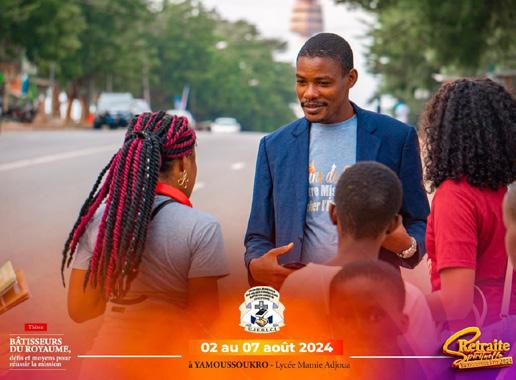
Ivory Coast — Ivorian young people gathered in Yamoussoukro, Ivory Coast, August 2-7, for a national youth camp.
Panama — Pastor Daniel of the Betania FWB Church in Panama City, Panama, baptized two people June 30, 2024.
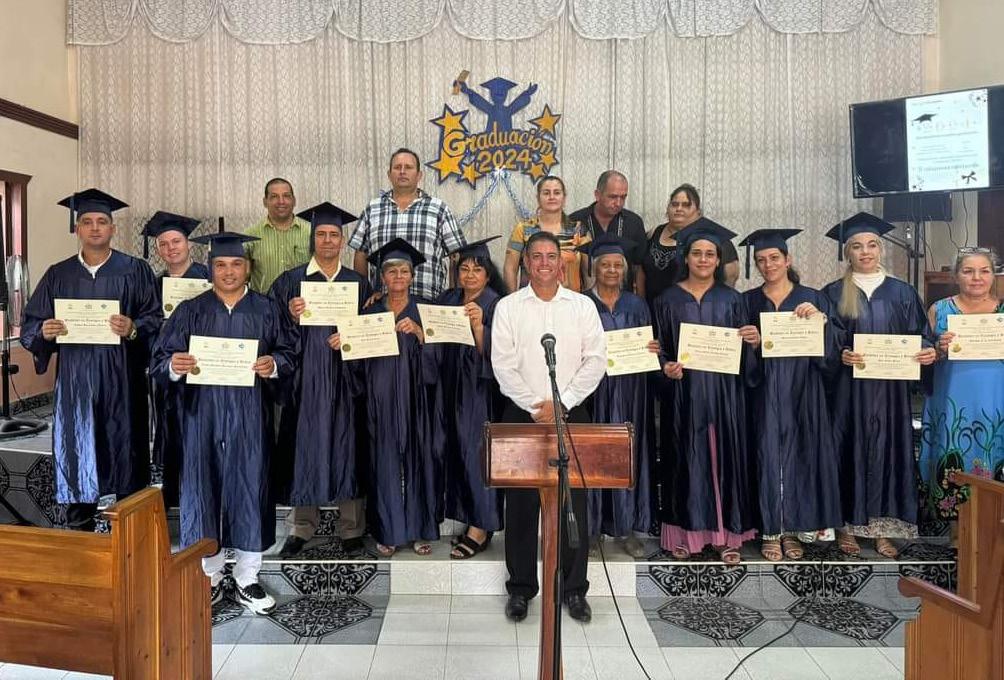
Cuba — Eleven students graduated with an associate’s degree from the extension course of the Cedars of Lebanon Seminary in the Minas de Matambre FWB Church.

Côte d’Ivoire — The National Association of Free Will Baptist Churches of Côte d’Ivoire met in Doropo August 14-16. Present were association officers, visitors, and 115 standing delegates and church delegates. During the proceedings, Sié Laurent Palé, pastor of the Tchafrité FWB Church, was ordained to the gospel ministry.
Panama — The church plant in Chepo, Panama, reported 11 new converts. They also began new preaching points in Río Paja de Cañita and Capira with five new converts in each. In addition to these church plants, the Chepo Church has an effective work with university students and a Bible study on the university campus.
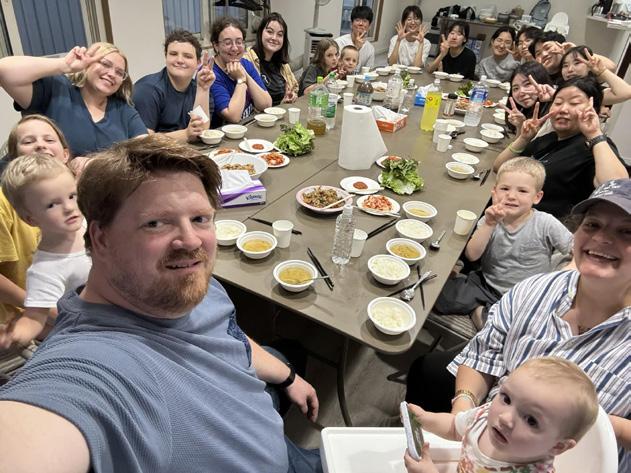
Japan — The Hokkaido team hosted a group of Korean college students for two weeks in July. The team’s main goal was to form connections and witness to college students in Hokkaido. They held several outreach events at the New Life FWB Church, providing opportunities for the Hokkaido team to strengthen relationships within the community.
Global Partnerships — Kenneth Eagleton visited Zimbabwe and Uganda during July. He met with potential partner organizations and people interested in joining Free Will Baptists.

Japan — Osam Sakamoto, associate pastor at the Hope Alive Church in Tokorozawa, Japan, baptized three people June 30. A teen and a married couple demonstrated their growing faith in Christ.
The wife entered Hope Alive looking for English-speaking friends, not realizing it was a church. Both she and her
husband had been exposed to Christianity. Emily Sakamoto wrote, “After a few conversations and Bible studies, it was clear she genuinely desired the strength, peace, and forgiveness of sins Jesus brings. She and her husband have shown great strength in this decision to follow Jesus together. They are a powerhouse for the Kingdom, with great faith and earnestly seeking to follow the words of Jesus.”
The third person baptized was a young teen named Erica. She and a friend are the only Christians in their school.
France — August 27, a young lady in the St. Nazaire church was baptized. Around 30 non-Christian family members and friends attended church and witnessed her baptism.
Dennis Teague baptized Lilou in the Atlantic Ocean.
Matt Price said, “We had an amazing day at the overflowing little wooden church today. We had 150 in attendance for Lilou’s baptism! For many, it was their first time in a Protestant church or to see a baptism in the ocean. It was a great, great day. We are already hearing many good conversations were held during the day.”
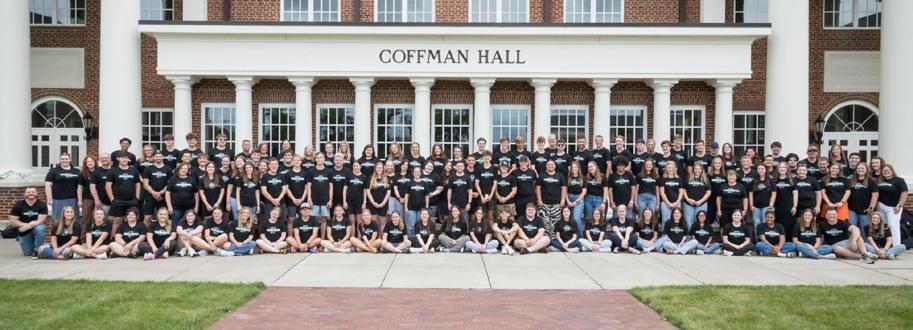

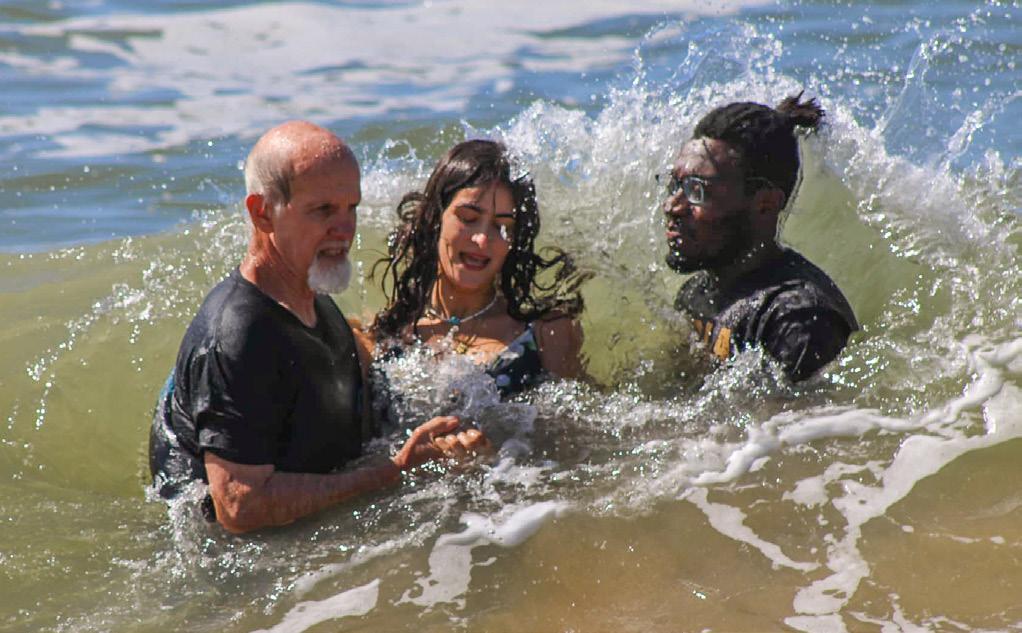
Student Missions — Ninety students and 18 leaders dispersed across nine locations in seven countries to experience cross-cultural missions in June. Teens served in Brazil (two teams); Bulgaria; Chicago, IL; Jamaica; Japan (two teams); Panama; and St. Croix.
Bulgaria — June 23, the congregation in Shumen, Bulgaria, held an ordination service for the church’s first deacon: Tsetso Zanev. Believers from Shumen, Kalugeritsa, Varna, and Svishtov attended. Tsetso continued the ministry to the three congregations in Shumen province while the Provow family completed their two-month stateside assignment.
Pakistan — A Free Will Baptist church in Pakistan baptized 24 people in the early summer.

Years ago, when we were both young, I remember my brother quipping, “We are half from California and half from Japan. Can’t we just say we’re from Hawaii?”
Growing up in dual cultures gave me an interesting perspective on what it means to be a citizen. My passport-country has always been the U.S., but I spent almost 15 years in Japan before going to university. I stumbled over the question about my “home country” on legal documents, not knowing whether to write “USA” or “ .”
Fast-forward to today. My wife and I have three kids, each with dual citizenship (Bulgarian and American) and two passports. My wife Debbie is also in the process of obtaining her U.S. citizenship. Our family is certainly an “international” family!
Our family ministers in Bulgaria with IM, Inc. The roots of communism are still heavily seen and felt throughout Bulgarian culture. Cement apartment buildings and statues of communist leaders all point back to a time of enforced nationalism under “the Iron Fist of the Soviet Union.”
Today, more than 35 years after the fall of the Berlin Wall, Bulgarians still showcase great pride in their country and history, amid its shortcomings. Much of the country realizes the dire effects of being under the communist yoke. Yet, optimism is building about what it means to be Bulgarian.
Bulgarians are proud of their heritage and the renowned bread which plays a role in many cultural traditions. The Bulgarian people have a sense of duty when they go to the voting booth and when they participate in folk dances at traditional weddings. When prompted, most Bulgarians gladly share their country’s crucial role played out over the last two millennium of world history. As a citizen of Bulgaria, one gains a lot of good and benefit.
Along with that comes some bad, too. Bulgarians do not deny the stagnant nature of the Bulgarian mindset in their youth. Many people talk about the atrocities Bulgaria committed under communism: putting Christians in concentration camps and government oppression of its own people. No country is perfect.
This is true for America. We have a powerful history of religious freedom and democracy, of empowering “the huddled masses, yearning to breathe free.” The United States has turned the tides of war, beaten the odds, and been used by God to give people freedom from slavery and oppression. But other parts of our history are not so stellar: taking land from Native Americans, corrupt politicians, slavery. While I know this country has done many things to make the Father smile, it is also comprised of sinful people who I’m sure have brought tears to His eyes.
The last few general and primary elections have been divisive. Understandably so. As citizens of the United States, we have the privilege of certain civic duties. God has used and continues to use people like you and me to fulfill His will. That is why we exercise our rights as citizens. We gather freely as believers or go to the voting booth. Yet, amid fulfilling our civic duties as citizens of the United States, we have a greater responsibility as followers of Jesus Christ. Our constitution affirms we hold some truths as self-evident, but the truths found in God’s Word hold an even greater weight.
In the third chapter of his letter to the church in Philippi, Paul reminded the congregation their citizenship is in Heaven. Paul charged the Philippian church to keep their eyes on Christ. As we participate as citizens of the U.S. today, it is no different for us. We must keep our eyes on Christ.









we hold some truths as self-evident,
but the truths found in God’s Word hold an even greater weight.
I am thankful for the myriad of benefits our children and I have — just because we are American citizens. We look forward to the day Debbie gains her citizenship, too. But that is not the end goal. The end goal is living a life that honors and glorifies the Lord. Why? Because He has given us citizenship on high!
Many people throughout history have been lured into thinking certain earthly citizenships are the chief goal of life. Consider Babylon, for instance. Babylon has a long history. We can read the account of the Tower of Babel, Babylon during the days of Isaiah, and Babylon under King Nebuchadnezzar. Babylon was an impressive sight to the people of its day. I am sure many people had their eyes on becoming citizens of Babylon and the benefits it would bring. No doubt, Babylon, in all its glory, seemed it would stand the test of time.
Today, 2,500 years later, Babylon lies in ruins. Archeologists dig deep to try and learn more about this city, which, at multiple times in history, was home to the greatest em-
pire in the world. Countries like Bulgaria, Chile, and Australia potentially face the same fate. The United States is not exempt from this list. Our citizenship and allegiance to the United States of America is a temporary entity. This great nation we live in is preishable and will only last so long. Whether the Lord comes back in two years or in 2,000 years, the United States’ future has an expiration date.
Compare this to the thought of our citizenship in Heaven, with God Most High as the Everlasting Ruler. What a stark contrast! We have the hope of a promised new heaven and new earth, no matter what happens in our country or around the world.
I find I often need the reminder of Babylon’s history in Scripture. I think of the account in Daniel 4, when King Nebuchadnezzar was humbled before the Lord. At the end of his seven-year humiliation, Nebuchadnezzar’s sanity returned to him, and he had an amazing realization of who is on the throne: the One “whose dominion is an everlasting dominion, and his kingdom is from generation

expiration date. Nothing puts that in jeopardy. The word eternal is a comforting concept when we know who holds our future.
My favorite airport in the world is the international airport in Istanbul. The shine and glamor of massive screens and the comfortable shops and restaurants make traveling through IST a little more bearable. But at the end of the day, the screens in this airport have a shelf-life. Eventually, the billboards will go to the dumpster. Thankfully, the “bling” of the airport in Istanbul is not why it is my favorite layover.
Every time I pass through the Istanbul airport, I stand in

ters from Nicaragua, and fellow believers from Taiwan, all sharing the same citizenship. Our earthly citizenship could not look more different today. But one day, all of that will fade away. And forever, we will stand side-by-side as heirs to the inheritance Christ has waiting for us on high.
No matter which state or country you are from, as your brother in Christ, I urge you to praise God for our heavenly citizenship.
About the Writer: Brenton and Debbie Driscoll returned to their work in Varna, Bulgaria, in June. They are parents to son Jamie and daughters Ruby and Hallie.
Will you be in the picture next Thanksgiving?
No one wants to think about the unexpected, but life is uncertain. So give your family the precious gift of being well-prepared. Since 2013, Free Will Baptist Foundation and Cornerstone Estate Planning have helped thousands of families avoid the legal and financial nightmares of probate court. Find peace of mind knowing your family is prepared, just in case, for a photo without you.

Partner with North American Ministries for Pre-Thanksgiving Days of Prayer, November 18-22.
The daily prayer guide below will help you pray intentionally for different areas of ministry leading up to the November 24 Mission North America Offering. As you pray, we hope you are encouraged by what God is doing through His people!
Be encouraged by the dedication of NAM church planters.
Across North America, NAM church planters continue to demonstrate exceptional dedication to the Lord. Even in challenging fields, these planters are cultivating congregations of believers committed to discipleship, outreach, and service. Ask God to continue blessing their ministries, their families, and their communities. Pray He will provide increasing opportunities to reach others with the hope of Jesus and call more church planters into this important ministry.
Be encouraged by the reach of NAM cross-cultural ministries. Multi-cultural ministry is thriving through the work of NAM’s cross-cultural church planters and English-speaking congregations partnered with them to reach countless individuals coming to America from around the world. Pray for NAM’s current team of Spanish-speaking pastors and their congregations. Ask the Lord to grow these ministries and pray He will provide the needed resources, workers, and opportunities for these ministries to fulfill their calling to diverse people groups and cultures.
Be encouraged by the service of FWB chaplains.
Our service members sacrifice each day to keep our country safe and free. Military chaplains and their families know these sacrifices well. In addition to serving our country, they also serve as ambassadors for Christ, proclaiming the gospel at home and around the world. Pray for our FWB chaplains and their families as they fulfill God’s mission for their lives. Ask God to bless them with peace, strength, safety, and encouragement to face the challenges before them.
Be encouraged by new Christian leaders.
Through the ministry of the NAM Hispanic Bible Institute, over 50 mission works have been started, and 380 graduates now minister across the U.S. and in Latin America. The first group of students to enroll in the Hispanic Institute since its relocation to Parkers Chapel in Greenville, North Carolina, started classes in August. Pray for these new students and their instructors. Ask God to use the institute to help them grow in their faith and knowledge of the Lord, so they can build the Kingdom wherever He leads them.
Be encouraged by your investment in gospel ministry.
We are thankful for the way God provides through the Church Extension Loan Fund. For over 40 years, investors have entrusted CELF to support gospel efforts by using their funds to provide building and expansion loans to church plants and ministries across the United States. Pray God will continue providing CELF with gospel-minded investors, and that He will direct CELF administrators as they seek to use these financial resources wisely to promote Kingdom work.
Video, paper, and digital MNA Offering promotional resources, including Pre-Thanksgiving Days of Prayer materials, are available at fwbnam.com/mna.
Make plans to give to the Mission North America Offering through your local church, by mail, or online. Your gifts enable others to go!
BY RUTH MCDONALD
It was not love at first sight. In fact, after the young guy flirted with her at a ballgame, Velma turned to a friend and said, “Who was that little boy?” Talmadge Brown did not make the impression he’d hoped on the pretty young lady with whom he was smitten.
His persistence won her over, though, and they were married on New Year’s Eve 1953 by a local minister in a simple home ceremony. Talmadge was 17, and Velma was 20. Those in attendance never stopped teasing Talmadge that he nearly caught his shirt on fire with the candles Velma lit for decoration.
Maybe it was not love at first sight, but it certainly was a love that endured until “death do us part” and beyond. Throughout nearly 70 years of marriage, theirs was a love so unusual it received nationwide notoriety through a series of news articles during the COVID pandemic.
It was not a Hollywood-style romance. Talmadge and Velma were never wealthy, famous, or glamorous. Both hailed from rural communities in East Tennessee and learned early in life to work hard and do without. Talmadge came from a family of ten children and grew up in a series of small cottages or “shacks” as he called them. Velma’s family were farmers who eventually owned their own small dairy farm. Neither grew up attending church with any regularity. With the demands of farming, feeding large families, and eking out a living during the Great Depression and World War II, neither family made church a priority. Velma, however, sometimes walked to church with her sister and, as a teenager, gave her heart to Jesus at a revival meeting. Unfortunately, she never established a habit of regular church attendance and did not receive the discipleship needed to grow in her faith. The young couple began married life without a foundation of strong faith in Christ.
Ten months after their wedding, they welcomed their first baby Norman. Thirteen months later, Kyle joined the family, and 13 months after that, baby Diana was born. The doctor who delivered all three is quoted as saying, “I’ll see you next year!”
He was to be disappointed, however, when six years elapsed before their youngest child, Connie, arrived.
While Velma was busy with the first three “littles,” Talmadge began hanging out with some young men who enjoyed playing cards and drinking. One day, when Velma opened the refrigerator to retrieve a baby bottle, she discovered Talmadge had added a beer bottle to the stash. As their daughter Diana Postlewaite recalls, “Mom might not have been a mature believer, but she knew beer bottles and
baby bottles should not be side by side in her refrigerator, and she let Dad know that by pouring his beer down the sink.”

Around the same time, some Christian men from a church in the community began visiting the Browns and attempting to talk to the young father about the Lord. Talmadge was not even a little bit interested. In fact, he made it his habit to sneak out the back door and disappear into the nearby woods when they came knocking.
On one snowy winter night, the visitors felt strongly they should pursue him. Because of the deep snow, Talmadge had not ventured into the woods as usual. The Christian men found him, shared the simple gospel message with him, and were thrilled when he gave his heart to Jesus. His young wife made a fresh commitment to follow Christ, and their walk of faith and ministry began. They determined from that point forward to raise their children in the Christian faith and to model a faithful lifestyle in their daily lives.
Liberty Free Will Baptist Church became their church home, welcoming the young family, discipling them, and giving them opportunities to serve. There, Talmadge answered the call to preach and was mentored by men such as Henry Bailey, Ralph Staten, and George Dunbar. Their willingness to disciple and train this uneducated and unchurched young man resulted in a pastoral ministry that spanned seven decades, three states, and at least eight churches.
It was never a marriage filled with romance, roses, and extravagant getaways. Most years found them celebrating their wedding anniversary at a New Year’s Eve watchnight service at the churches they pastored. Velma was a dedicated stay-at-home mom and pastor’s wife whose life was characterized by faithfulness and hospitality. Their son Kyle Brown recalled her role as hostess was not always voluntary but always cheerful. She weekly prepared Sunday lunch for her family but was often informed on the way home from church another family or two would be joining them.
When asked about the secret to their parents’ successful marriage, their children offered several themes:
They shared common goals and interests: to love and serve Christ and His church, to raise their children in the faith, and to work together to make their relationship succeed. Each became a student of the Word, and they dedicated themselves to obeying its content. They enjoyed gardening and traveling throughout their lives and into retirement.
They each knew their role and fulfilled it. Their marriage operated according to traditional roles, and each was happy and secure. “Mom didn’t try to be Dad, and Dad didn’t try to be Mom,” says their son Kyle. “It really was beautiful teamwork in ministry and in the family.” Both gave 100% of their energy to the tasks before them and remained hard workers who found joy in a job well done.
They maintained a sense of humor. Though Velma was a quiet, behind-the-scenes person, she always had a twinkle in her eyes that indicated she was never far from laughter. She loved Erma Bombeck and other humorous columns in the newspaper, but she also found humor in everyday life. Talmadge enjoyed practical jokes and amused himself by waking overnight guests with a loud fiddle serenade.
They took care of each other. Their mutual love manifested in a deep respect and selfless attention to the other’s needs. Velma was a good cook and a loving, respectful wife and mother. Talmadge worked hard to provide for his wife and family in every way and spent even his leisure time working on various home projects. When they reached retirement years, Talmadge used his days off to build a home near Erwin, Tennessee, where they met those many years before. When the home was completed, the couple moved into what they hoped would be their forever home.
However, by the time Velma turned 80 in 2013, it was evident she was suffering from Alzheimer’s. Talmadge lovingly cared for her in their home as long as he could, but a move into the Memory Care Unit at Governor’s Bend became inevitable in 2016.
In the words of their son Kyle, “When Mom came down with Alzheimer’s, Dad’s world turned upside down. It was a natural pivot for him to turn his entire focus on caring for her, and that’s exactly what he did. The life they had built together was so precious to him that his entire purpose in life became making her as secure and comfortable as possible. The days and years they spent together now culminated in a beautiful reverence and an outpouring of love to the
one who had been by his side for the past nearly 70 years of marriage. And what a beautiful story it was.”
Their daughter Diana adds, “On July 1, 2016, the daily (often twice a day) trips to visit his sweetheart began. His well-documented ’window visits’ from March 2020 until he sold their beloved home and moved into Governor’s Bend himself in August of that year, were nationally documented by various news services. What became a ’story’ during COVID didn’t surprise any of us children. Our parents had been totally devoted to each other and to the Lord before the disease that separated them became part of their history.”
“What became a ‘story’ during COVID didn’t surprise any of us children. Our parents had been totally devoted to each other and to the Lord before the disease that separated them became part of their history.”
In an interview with WJHL, News Channel 11, Talmadge explained why he spent so many hours outside Velma’s window. “We’ve always been real close together. We’ve never been separated in over 60 years of marriage, and I just want to be with her all the time.”
When asked about how it felt to go home at night, he replied, “It’s tough, because…it’s lonely.” (Read the interview: https://bit.ly/2UgORy6)
The staff at Governor’s Bend loved Preacher Brown and Velma and were often moved to tears by the beauty and rarity of their relationship. As one staff member is quoted as saying, “Everyone should be loved like they love each other.”
After 69 years of marriage, Velma passed away in January 2023. Talmadge followed less than 15 months later in April 2024. Their earthly bodies are buried in the beautiful cemetery at Liberty Church, the church that loved them and trained them so well.
When 17-year-old Talmadge asked Velma’s dad for permission to marry his daughter, the answer was, “Well…I guess she could do worse.”
Indeed, the passing years made it obvious that neither could possibly have done any better. Their love was the real thing.
About the Writer: Ruth McDonald is director of WNAC. Learn more: www.WNAC.org.
BY RON HUNTER JR., PH.D.
Coffee options used to be simple: black, decaf, cream, and sugar. Today, orders like “venti iced caramel macchiato blonde espresso, two shots, four pumps of white chocolate drizzle, and sweet cream” are common. Coffee and leadership have evolved similarly.
Leadership, once synonymous with management, is now viewed as an art with diverse styles. Just as art varies, leadership approaches vary based on the situation. When soldiers come under fire, leaders shift to an autocratic mode, issuing direct orders to save lives. During battle planning, collaboration is more effective.
What are some styles of leadership that may be utilized?
• Transactional Leadership: Leaders exchange rewards for performance or compliance. While mostly unhealthy because the leader focuses more on results than relationships, without certain exchanges — paychecks, for instance — no one would follow.
BIBLE VERSES
Matthew 20:25-28
Philippians 2:3
Romans 1:1
Nehemiah 1-3
2 Corinthians 12:9
LEADERSHIP QUOTE
“Servant leadership is all about making the goals clear and then rolling your sleeves up and doing whatever it takes to help people win. In that situation, they don’t work for you; you work for them.”
—Ken Blanchard
• Transformational Leadership: Leaders focus on elevating followers through ideals, inspiration, intellect, and individual consideration. Mordecai demonstrated a transformational approach when Esther rose in power above him, yet he continued to help her develop.
• Servant Leadership: Leaders desire to serve others by helping them grow. This involves giving them more power and teaching them how to exercise it. Paul showed servant leadership as he mentored church planters and young leaders.
• Biblical Servant Leadership: Based on servant leadership but with emphasis on character, motive, and agenda in keeping with God’s purpose and will. Christ demonstrated this when he shifted power to His disciples to fulfill the great command and commission.
• Adaptive Leadership: Leaders help communities face their problems and form new attitudes and behaviors, sharing joint responsibility to improve or

change the projected outcome. Adaptation is needed in light of the many obstacles organizations face today.
• Trait Leadership: This leader-centric approach values characteristics and traits considered ideal for a leader: height, voice, knowledge, strength, and other qualities. Trait leadership is demonstrated in Saul’s selection as Israel’s first king, not always true marks of leadership.
• Skills Leadership: Many leaders reach their position as a result of certain skills, which can include expertise, efficiency, speed, or characteristics that enhance performance.
• Ethical Leadership: Leaders help followers focus on a direction that morally benefits the community. The rules of the Bible all fit moral leadership because they exist for both the community and the leader.
After considering a few styles of leadership, you may wonder which one is correct. This answer must be based on the problem, goals, and assets. Determine the best style for the situation, however, most approaches require layering or combination. Just remember, when you order coffee, sometimes you just want it black, but other occasions may require a double-shot Americano with sweet cream.
About the Columnist: Ron Hunter Jr. has a Ph.D. in leadership and is CEO of D6 Family Ministry. You may contact him at ron.hunter@d6family.com.

BY BARRY RAPER
2 CORINTHIANS 1:3-11
Some years back, a doctor named Richard Swenson wrote the book Margin. His basic premise was that we need margin in our lives to be emotionally, physically, and spiritually healthy. Swenson argued the basic formula is simple: power minus load equals margin. Your power includes physical strength, financial resources, and your support system. Your load includes home and work responsibilities, financial obligations, and stress. When your load exceeds your power, you don’t have margin, and if you live without margin, over time, you will experience serious consequences.
We all experience times or seasons in our lives when the load far exceeds our power — days when the weight is simply crushing, pushing us beyond our limits. How should we respond when life is simply too heavy to carry?
Second Corinthians is the Apostle Paul’s most personal letter. As readers progress through the book, they catch a glimpse of Paul’s personal and ministry struggles in a way not seen in some of his other shorter epistles. In chapter one, Paul let us in on what he and his companions experienced in Asia — difficulty both inwardly and outwardly.
The word translated tribulation or affliction in this passage (verse 4) communicates the idea of being pressed or squeezed. Perhaps you have heard the phrase “God will never place more on you than you can bear.” In his first epistle, Paul told the Corinthians (concerning temptation), “God is faithful, who will not suffer you to be tempted above that ye are able; but will with the temptation also make a way to escape, that ye may be able to bear it” (1 Corinthians 10:13).
While it is true I will never face a temptation beyond my ability to resist (with God’s help), I will also experience moments in my life when I am so pressed, squeezed, and burdened by life that endurance is beyond my ability; life
is more than I can bear. That is what Paul said here at the beginning of his second letter to Corinth. However, he also makes it clear when life is too heavy, God will work the difficulty to our good by teaching us three important lessons.
1. You learn who God is (verses 3-4). When life is too heavy, God comes into clear focus. In verse 3, Paul described Him as the Father of mercies. Lamentations 3:22-23 tells us God’s mercies are new every morning. Each day He provides new and fresh mercies, sufficient for the day and season of your life.
When my mother was first diagnosed with cancer in December 2014, she consulted with doctors in Mississippi regarding treatment and prognosis but then sought additional opinions. In time, this led her to Vanderbilt Medical Center in Nashville, Tennessee, near my home, and she began treatments there. She came to visit every two weeks, and looking back now, I see God’s great mercy to me in these circumstances. If she had not come to Nashville for treatment, I would have been unable to see her as often during the final years of her life. God is merciful.
He is also the God of all comfort. His comfort varies. It may come through the touch and words of a loved one, a song at church or on the radio, an unexpected blessing at just the right moment, or direct ministry of the Holy Spirit to the soul. Regardless of how comfort comes to us, Paul identified God as the source. God the Holy Spirit is the great Comforter, the One who comes alongside us, who is always with us.
He is the God who raises the dead. He raised Jesus from the dead, giving testimony as to who Jesus was and what He accomplished in His work. As a pastor, I have been there when people have died; I have stood beside many caskets with grieving loved ones. In those moments,
words are powerless. But not for the Lord, who can raise the dead, who will raise those in Christ at the end of time to receive glorified bodies and be reunited with those they love.
When life is too heavy, pay attention to the right voice — the voice of God who lifts you up, carries you, and brings light into your darkness.
2. You learn who you are (verses 5-6). I am a child of God. Nothing else really matters in terms of titles or accolades or accomplishments or status. And as a child of God, when life is too heavy, it teaches me several things:
• I have limits. In our youth, perhaps, we feel as if our strength is endless, but time and life have a way of reinforcing our limitations. And this is where Paul was, right? He had been pushed and pressed beyond his limit.
• I am dependent. This is where the slogan “God will never put more on you than you can bear” fails. Again, according to 1 Corinthians 10:13, this is true concerning temptation. But in life itself, according to Paul, sometimes God does place more on you than you can bear. Paul described his situation as great pressure, far beyond his ability to endure, despairing of life itself, and facing the sentence of death. We might say he was “at the end of his rope” or had “hit rock bottom.” We must reach the end of ourselves to discover more of God. We must be weaned off all self-reliance. Paul said the events in his life happened for a reason, a bigger and better purpose: so, he would not rely on self but on God who raises the dead.
Are you tempted to rely on yourself? Intellect, problem solving, physical strength, willpower, sheer determination? Perhaps your gifts and abilities? At some point, we will learn we aren’t enough. We need absolute reliance upon God.
• I have a purpose. Suffering teaches us to be a channel of God’s grace. After we are comforted in trouble, God, in turn, wants us to comfort others.
3. You learn who you can count on (verses 7-11). Paul didn’t want the church at Corinth to be unaware of the suffering he and his companions experienced in Asia. We do well to follow this example, not to hide struggles,
attempting to carry our burdens alone. If he lived in our social media-driven culture, Paul might have been tempted to post “only good pictures” from Asia, showing the team having a great time and living their best lives. But we all know social media doesn’t present the total picture, especially of what is going on inside. Instead, Paul, with full transparency, admitted his struggles and asked for prayer. I can’t help but think of Paul’s own words in Galatians 6:2: “Bear ye one another’s burdens, and so fulfill the law of Christ.”
To quote the old country song:
Run your car off the side of the road
Get stuck in a ditch way out in the middle of nowhere
Get yourself in a bind, lose the shirt off your back
Need a floor, need a couch, need a bus fare…
You’ll find out who your friends are.
This is (or should be) true in the church. When life is too hard and too heavy for us, we find friends in our Christian family who help shoulder the load and pray faithfully for us. Paul said in verse 11: “Ye also helping together by prayer for us, that for the gift bestowed upon us by the means of many persons thanks may be given by many on our behalf.”
God will deliver, and yet Paul still urged the Corinthians to pray. When more people pray, when God delivers, then more people can give thanks. I know you can’t always share the difficulties of your life in detail with the whole church, but whenever you can share a need with others — even a handful of other believers — and they band together to pray, you learn more about the family of God.
Is life too heavy for you right now? I hope not. But with this many readers, I am sure someone somewhere is carrying a load beyond what he or she can bear. As these difficult days make your limitations clear, may they also teach you or remind you who God is, the Father of mercies and the God of all comfort. May your hard days lead you to discover the people in your life upon whom you can rely, no matter your circumstances.
About the Columnist: Dr. Barry Raper is associate dean of Welch Divinity School and pastor of Bethel FWB Church near Ashland City, Tennessee.
BY PHILLIP T. MORGAN


I like politics — always have, ever since I was a little fellow, riding in my father’s truck listening to talk radio and asking him questions about the subjects being debated. Still, I sometimes get tired of the media ruckus and having the same old arguments. Some arguments, however, are very important to continue, even when we get tired. One of the important battles of our day is whether the United States of America had a Christian founding.
Over the past 70 years, secularist scholars have made a concerted effort to separate religion from any aspect of American government, including the founding. While they were right to criticize oversimplistic interpretations of American history that align America’s national trajectory with God’s providential plans for the rest of the world, their alternate interpretation skews way too far in the other direction. As a result, an ongoing battle has ensued to determine just how “Christian” America’s founding was.
Sometimes when people discuss this topic, they seem to communicate all the founders were orthodox Christians. This standard is unhelpful. No society anywhere, at any point in history, has consisted only of orthodox Christians.
Attempting to portray every founding father as a robust evangelical is a mistake. The historical record does not support it. The broad majority of the men who represented their communities in the Continental Congress and the Constitutional Convention were orthodox Christians (some even ministers), but a few clearly held unorthodox beliefs, and others were outright Deists.
On the other hand, liberals and their sympathizers should be careful about trying to read between the lines of every communique from the eighteenth century for closeted Deists. Most arguments historians have used to claim founders like George Washington were Deists are made from negative evidence — that is, an absence of what they consider to be sufficiently Christian language. However, as Mark David Hall demonstrates in Did America Have a Christian Founding? the number of founders who can clearly and definitively be classified as Deists is vanishingly small and does not include Washington.
F. Leroy Forlines also provides helpful analysis in Secularism in the American Republic, where he gives detailed attention to the thinking of Thomas Jefferson and James Madison on the importance of Christianity to the health of the republic. Jefferson famously held heterodox religious beliefs, but he was no secularist. Rather, he believed that Christianity with its moral practices is essential for the success of the democratic-republican form of government. To his thinking, the Christian worldview promotes a culture that makes liberty from invasive government possible.
Perhaps the most Christian aspect of America’s founding was the culture of the day. Certainly, many colonists were not redeemed believers, but the entire ethos of the culture was saturated with what we call a Christian worldview today. A young person growing up in eighteenth-century North Carolina or Rhode Island had almost the exact opposite experience of our children. He or she was encouraged by most aspects of society to live according to a Christian moral standard regardless of his or her personal relationship with God. While we may struggle to imagine such a world during this time of great wickedness where social pressures demand we reject the truths of the faith, that world was real.
Those who lived in that era perceived that early American culture was unique even compared to other countries of the day. For example, sociologist Alexis de Tocqueville visited the United States in the early 1830s to research why its citizens were so successful in developing a remarkably free society. The question interested him greatly because his home country of France suffered horribly during its revolution some forty years earlier and continued to struggle to provide liberty for its people.
Tocqueville concluded the two structural factors in American success were the decentralized power of the state that left local governments in charge of day-to-day governance and the existence of a robust civil society that assumed the responsibility of addressing social problems rather than shifting the burden to the state. Significantly, he concluded these structures were possible only because Christian habits of thought and action regulated the conduct of nearly everyone in the society. Almost every founding father said much the same in public and private communications.
At this point you may be thinking, “But didn’t the Enlightenment provide the intellectual foundation for the political design of the country? Then how Christian can that aspect of the founding be?”
In fact, the Enlightenment is not a monolithic movement. Some aspects of the Enlightenment influenced some of the founders, but other aspects of the Enlightenment most
assuredly did not. Secularist scholars often exaggerate the importance of the most radical ideas of the Enlightenment to argue that Christianity should be excluded from the public square. However, these interpretations are overwrought.
For example, some of the founders’ ideas were informed by Enlightenment thinkers like John Locke, Charles de Montesquieu, and Adam Smith. But these three men were not radical like Jean-Jacques Rousseau or Voltaire, and they produced ideas that were often but not always compatible with orthodox Christianity, accurately reflecting the world God has made. However, the founders clearly diverged from the radical ideas of the Enlightenment. For this reason, many scholars have noted clear distinctions between the American War for Independence and the French Revolution.
For instance, significantly, the American founders held a Christian understanding of the nature of man. That is, they were convinced all men are flawed in their character. Most articulated this belief as resulting from the Fall. But even those who did not believe in the Fall believed that no one, regardless of birth or education, was exempt from the reality of imperfection. For this reason, they argued it is essential to provide checks and balances in governmental structures to avoid allowing any one person or group of people to rule without limit.
Federalism limited the power of any one group by preserving the powers of government the states held prior to the ratification of the Constitution. The Tenth Amendment made the limitation of the federal government explicit by stating most of the powers of ruling society had been left to the states and to the people individually (civil associations). As a result, our nation, bolstered by a Christian culture for many decades, has successfully maintained a working democratic republic with immense personal liberty for nearly 225 years.
The founders’ belief in man’s fallen nature diverges significantly from an Enlightenment belief that denied the doctrine of original sin. Some Enlightenment thinkers even argued all men were born “essentially good” but were perverted by society. Others contended the powerful and rich were untrustworthy, but the commoner could always be trusted to make the right decision. These beliefs had disastrous consequences during the French Revolution,
when Enlightened political philosophy produced a government with a skewed vision of man’s nature, a highlycentralized state that smothered civil associations, and a lack of effective checks and balances that led to years of tyranny, vigilante executions, mob activity, and chaos.
A student recently — with respect and genuine curiosity — asked me, “Why should I care whether the founders were influenced by Christianity or the Enlightenment?” The question is a good one.
• First, we should note that atheists and those actively promoting wickedness in our culture think this argument is an important one to win because they know history shapes our identity in the present and informs how we proceed into the future.
• Second, as Christians, we believe truth matters. Falsehood always leads to destruction. So, we must maintain the truth about the past to promote human flourishing for our neighbors — even the unbelievers.
• Third, those arguing for an Enlightenment foundation for our government also oppose Christians pursuing politics through a Christian worldview. We need to stand firm in opposition to this limitation of our religious freedom protected in the Bill of Rights and recognize such arguments are a form of religious persecution.
Is it accurate to say America had a Christian founding? Yes.
The Christian worldview was dominant in the culture, it was essential for the functioning of a limited government, and it provided the intellectual foundation for the founders’ thinking when it came to political structures. These points do not mean every founding father was redeemed or that America is destined to bring about the millennial reign of Christ. But it does mean theology has always informed our politics and should continue to do so through us.
About the Writer: Phillip T. Morgan is curator of the Free Will Baptist Historical Collection (fwbhistory.com) and History Program coordinator at Welch College (welch.edu).
at Welch College
Gallatin, TN—Welch College recently began its first classes in a new Master of Arts (M.A.) degree in Organizational Leadership, according to Dr. Greg Ketteman, vice president for strategic initiatives.
Designed for leaders of non-profit and for-profit organizations, the interdisciplinary program aims to provide organizational leaders with graduate education in the art and science of Christian leadership, inspiring professional excellence through integration of biblical thought and life.
The 33-hour degree program will be available in a 100% online format, accessible to busy Christian men and women who serve as leaders in nonprofits, businesses, communities, athletics and recreation, educational organizations, and ministries.
Dr. Greg Ketteman will coordinate the new program. In ad-
dition to his doctorate in educational leadership, Ketteman’s background in organizational leadership includes doctoral-level study in Public Administration, more than 15 years as a school administrator, and 18 years of executive leadership in higher education.
“We’re so excited about this new program,” Ketteman said. “There has never been a greater need for Christian leaders with integrity who live out the timeless, unchanging truths of Scripture. We believe the M.A. in Organizational Leadership will strategically position strong, well-prepared servant-leaders to serve God in building His kingdom.”
The first courses began in September. For more information, visit welch.edu/MAOL or contact Dr. Greg Ketteman at gketteman@welch.edu. Apply now online at welch.edu/ MAOLapply.


BY JEFF CAUDILL
TRUTH: that which is true, real, or actual.
INTEGRITY: soundness of moral principle; the character of uncorrupted virtue, esp. in relation to truth and fair dealing.

HONESTY: the quality or condition of having or displaying strong moral principles, esp. regarding lying, cheating, or stealing.¹
I am passionate about truth-telling, integrity, and honesty in everything. One of my concerns around election time is the distortion and absence of truth. It appears many politicians, political parties, and media outlets give a version of the truth that fits their agenda or makes their point. The problem is there is little genuine truth in any version we see or hear regarding their points of view. Many issues reported are completely absent of any truth.
As Christians, we believe (or should believe) in absolute truth. We affirm, based on the Bible, certain statements and beliefs are true for all people at all times. #TRUTH
However, our society does not adhere to that affirmation. The mindset of our day is there can be different truths. The mainstream view is everyone has, or can have, “their own
1 Oxford English Dictionary, 2024. Oxford University Press.
truth.” Instead of individuals being right or wrong in opposing points of view, society states each person is relating his or her “own truth.” And a person’s “truth” may even evolve over time.
Truth is not based on individual or group perspectives. Different scenarios or statements are either true or false. Either an event happened, or it did not. Something was said, or it was not. A person was in a certain place, or he was not. One person had a certain experience, or she did not. One sibling says he hit me; the other says he did not. All scenarios or statements cannot be true.
In John 14:6, Jesus said, “I am the way, the truth, and the life: no man cometh unto the Father, but by me.” If we as Christians affirm that statement is true, any other statement or “truth” contradicting that statement is false. John 14:6


cannot be “my truth” or “their truth.” The truth is there is only one way to God, and that way is through Jesus Christ. Period. #TRUTH
Other absolute truths in Scripture stand contrary to what the majority in our culture declares as their version of truth.
• God created the heavens and the earth. (Genesis 1:1)
• Marriage is for a man and a woman. (Genesis 2:24)
• Men and women are distinctly created by God in His image as males and females. (Genesis 1:26-27)
• Jesus was born of a virgin, lived a sinless life, died a substitutionary death, and rose from the grave (Luke 1:26; 2 Corinthians 5:21; 1 Peter 3:18; Luke 24:5-6).
Beyond these absolute truths in Scripture, other statements are also true and false. However, today’s society has “muddied the waters,” and we are never sure if someone is telling us the truth or not. Integrity, or being able to take someone at his or her word, seems to be a thing of the past.
People are guilty of distorting the truth, or using partial truths to serve their own purposes, or telling outright lies and calling it the truth. Proverbs teaches us God expects truthfulness. As a matter of fact, He can’t stand dishonesty and considers it an abomination!
Consider these verses from Proverbs 12:17, 19, 20:
He that speaketh truth sheweth forth righteousness: but a false witness deceit. The lip of truth shall be established for ever: but a lying tongue is but for a moment. Deceit is in the heart of them that imagine evil: but to the counsellors of peace is joy. Lying lips are abomination to the LORD: but they that deal truly are his delight.
Dishonesty is an abomination to God; He is disgusted by it. He delights and takes pleasure in honesty.
It is also noteworthy we find lying/deceit in the list of things God hates from Proverbs 6:16-19:
These six things doth the LORD hate: yea, seven are an abomination unto him: a proud look, a lying tongue, and hands that shed innocent blood, an heart that deviseth wicked imaginations, feet that be swift in running to mischief, a false witness that speaketh lies, and he that soweth discord among brethren.
It is clear from these passages, God’s expectation is for His people to be people of integrity who tell the truth and do not practice deceit.
What is disappointing regarding integrity is we have fooled ourselves into believing our own lies. We excuse dishonesty
by stating it is best for the situation, or we don’t want to hurt people’s feelings, or we just want to get along. So, we do not tell the whole truth. In addition to outright dishonesty, we distort the truth, using deceit to further our agenda and to get our own way. (I realize some truths ought not be shared; just because something is true does not mean it needs to be said aloud. That is a conversation for another day.)
To be people in whom God delights, let’s focus on the following: #TRUTH
1. Absolute truth should influence our conduct in the home, workplace, school, marketplace, and even the voting booth. Look for honesty and celebrate it. Be trustworthy in the workplace and when conducting business. Be reminded by the book of Proverbs, “Divers weights are an abomination unto the LORD; and a false balance is not good” (Proverbs 20:23). Once again, God uses the word abomination.
2. As parents, we need to demonstrate honesty as an example for our children and expect it in return. We should have conversations about absolute truth and how to know what is true. Truth is not relative, nor is it based on feelings or perspective.
Someone can sound convincing or feel strongly about something without it being true. There is no such thing as “his truth” or “her truth.” If there were “his truths,” “her truths,” “my truths,” or “your truths,” there are no truths. We all need to be sure our children understand and embrace the idea of truth. As parents, have as your goal to raise children of integrity. Model it and expect it.
3. As Christians, we should be truth tellers. We should never be guilty of using deception, deceit, or half-truths to get our way, further our agenda, or make ourselves look better. How sad is it that one Christian cannot be confident another Christian is being completely honest? Brothers and sisters, this ought not be!
I want to be a person with sound moral principles, with character of uncorrupted virtue — integrity (maybe this article was just for me). I want people to know I will always be honest and speak truth. Let us all strive to bring delight to our God by being people of honesty! #TRUTH
About the Writer: Jeff Caudill serves as the executive pastor at Cofer’s Chapel in Nashville, Tennessee, (coferschapel.org) and as marketing operations manager at Welch College. Learn more: welch.edu.

Through a qualified charitable distribution (QCD), individuals aged 70½ or older can donate up to $105,000 to ministry directly from a taxable IRA rather than taking their required minimum distributions. Bless a ministry and enjoy a tax break, too!
Coming February 1, 2025!
Live Stream Location: The Donelson Fellowship



Continued from page 15

and our people. Ken has also led several work groups to New Durham, New Hampshire, to restore the Ridge Church, the “mother church” of Northern Free Will Baptists. We now own this historic church and provide maintenance and upkeep for the building and the property. We continue to cooperate with and support Richland Ave (the Board of Retirement), the FWB Foundation, and the Executive Office and Dr. Eddie Moody.

I have shared many things with you in this short article, but there is much more we want to accomplish for Free Will Baptists and for the Kingdom of God! God has placed me in a position I never could have imagined. He has placed wonderful Christian servants around me who encourage and support me daily. Our department of seven employees has a total of 110 years of experience at NAM. That blows my mind!
We didn’t start yesterday! This department has been faithful for 86 years under the leadership and direction of some of the finest men I have known. I don’t understand why God allowed me to walk in this place, but I know I follow



the footsteps of the giants who walked before me, and it’s easy to see the footprints of giants.
• Will you help us as we begin the next 86 years?
• Will you help us to have a record Mission North America Offering this November?
• Will you partner with us as we partner with other departments, churches, and Free Will Baptist men and women across our denomination?
• Will you join us and support us as we are involved in North American Ministries?
I believe with all my heart and soul you will. Thank you for your prayers, your encouragement, your love, your kindness, your financial support, and your trust. Your generous gifts to our Mission North America Offering each year help us continue the many ministries God has entrusted to us.
About the Writer: Dr. H. David Crowe is the CEO of FWB North American Ministries. Learn more: fwbnam.com.

BY MATTHEW STEVEN BRACEY
How should we vote when all viable options have problems? To answer this question, one must survey the fundamentals of Christian ethical analysis and examine the approach of realistic idealism. In short, we have a duty to vote for the achievable option that best preserves God’s purposes for government. Please note: this article is an endorsement only of the principles it espouses, not of any candidate.
Ethicists rightly observe that Christian ethical analysis balances objectivity (conduct, actions), subjectivity (character, agent), and teleology (goals, ends). First, it recognizes some actions are objectively right or wrong; respect for elders is right, whereas murder is wrong. Political policies necessarily represent positions about the morality or immorality of issues related to justice, life, marriage, religion, and so on.
Second, Christian ethics considers individual morality; for this reason, Scripture consistently appeals to holy living. Christian voters therefore rightly concern themselves with the morality of candidates and citizens

alike. The application of this point can be complicated when a candidate with poor character supports policies that, compared to the alternative, succeed better in helping ordinary citizens live virtuous lives.
Third, Christian ethics contemplates the consequences resulting from the first two elements. We see this point in the New Testament authors’ repeated appeal to purpose clauses (“so that”). Responsible ethical analysis thus ponders the likely consequences to follow from specific platforms. This point is truly sobering when we reflect on how a platform’s domestic and international policies will impact billions of people.
Significantly, to pursue a fully Christian ethic, we must engage the issues holistically to avoid isolating any one element from the others. Mere appeal to conduct, character, or consequence reveals an ethic of strict deontology, individualism, or consequentialism, respectively. In contrast, Christian ethical analysis balances all three elements.
Holistic ethical analysis is multifaceted, not reducing Christian ethics to a single point.
The sole appeal to conscience fails to examine policy questions. To illustrate, one’s conscience says to vote for the candidate with the better platform, whereas another’s conscience says not to vote for that candidate because of his character. By reducing such questions to individual conscience, we exchange
Christian ethics for a Christianized ethical individualism (to say nothing about whether our consciences may be wrong, cf. Acts 23:1; 24:16).
Similarly, the solitary appeal to Christian liberty as the right to vote for whomever one chooses makes the same mistake because it does not sufficiently balance the individual with policies and results. Besides, this interpretation fundamentally misunderstands the doctrine, which, instead, concerns one’s freedom to do what he would otherwise not do because he loves his fellow Christians (Romans 14:14-17; 1 Corinthians 9:11-18). If anything, the application of Christian liberty to voting would lead a person to vote for a candidate he would rather not vote for because that candidate’s policies serve others better than the alternative.
Likewise, the idea of being a single-issue voter commits a similar mistake because it isolates one element from the others. Yes, single issues are important, but they miss the forest for the trees.
Responsible political analysis is more multilayered than any one factor. It balances questions of policy and character and assesses the likely consequences to result from them. Plainly, this task is not easy because it creates ethical tension.
What should we do if the people associated with the better platform fall short of its ideals or the platform is not as strong on an issue as we would like? We lean into the difficulty, working carefully through the tensions. Yes, a candidate’s character is important; yes, a platform’s position on a single issue is important. But such considerations are not everything; we must also consider the platforms’ policies
in the aggregate and their likely results on a national and international scale.
Holistic ethical analysis is multifaceted, not reducing Christian ethics to a single point.
F. Leroy Forlines articulates this idea as realistic idealism in Biblical Ethics. Ideals are good, but brute ethical idealism fails to engage the real world meaningfully. In contrast, realistic idealism meaningfully engages the real world with true ideals. Forlines’ discussion builds on his earlier discussion of the four basic values (holiness, love, wisdom, and ideals) in which he states the application of love, wisdom, and ideals is flexible in the real world.
Applied to political ethics, realistic idealism knows that no option is without problems. But it does not therefore effectively remove its witness from the process. It recognizes we will not achieve our ideals perfectly because the body politic necessarily includes competing ideals. Therefore, realistic idealism is flexible; it finds reasonable compromise when it reflects wisdom.
Realistic idealism means we do not live in a perfect world.
Realistic idealism means we do not live in a perfect world.
Even so, some criticize compromise as being dishonorable because it loses the ideal. However, compromise is a net good when it would realize some of an ideal against the prospect of realizing none of the ideal. Besides, it is an unavoidable component of any social body (e.g., families, churches, and workplaces). We see it, for example, in the outcome of the Jerusalem Council, a compromise between the ideals of Jewish and Gentile Christians (Acts 15:22–29).
Consequently, we should be unsurprised by the phenomenon of compromise in politics. The accounts of Joseph, Daniel, Ezra, and Nehemiah present people who clearly recognized the flexible nature of actualizing ideals in a broken world. Additionally, they worked with deeply unsavory characters—womanizers, idolaters, and the like. Undoubtedly, they preferred a better set of circumstances (not exile), but they did not live in that world.
Biblical examples demonstrate the application of ideals is flexible in the real world, often requiring compromise.
Our circumstances are not that dissimilar from these figures, except we also have the responsibility to vote for the most realistic option who best realizes God’s vision for government. In Romans 13:1-7, Paul explained that God established governing authorities for the purposes of upholding good and punishing evil. Moreover, in 1 Timothy 2:1-2, Paul held that believers should influence the governing order for good; specifically, he instructed Timothy to pray that governmental leaders would support policies allowing Christians to lead tranquil lives.
Biblical examples demonstrate that the application of ideals is flexible in the real world, often requiring compromise.
God also instructs us to use available means to encourage a governing order that upholds good and punishes evil. Certainly, prayer is one means, but another means is voting. Realistic idealism reminds us the best option is not the ideal option if it is an unrealistic option. In circumstances where only one of two platforms will realistically win, a vote for an ideal but unrealistic option makes it more likely the even worse option will succeed.
God desires we do our best to influence the governing order according to His designs: upholding good and punishing evil.
Realistic idealism causes us to face the fact squarely that whatever choice we make contributes directly or indirectly to the eventual outcome. These stakes are not easy but honest. Realistic idealism flexes around the real world the best it can.
Friends have asked about my view on voting for an ideal but unrealistic option (e.g., third parties or writeins) in non-battleground states. I appreciate the good reasons people might consider this proposition, but it strikes me as unwise. If enough people choose the idealistic path over the realistic one, these states will not remain uncontested, increasing the likelihood of an even worse path.
God desires we do our best to influence the governing order according to His designs: upholding good and punishing evil.
Sadly, I do not believe the prospect of the church banding together to vote for the idealistic path in hopes it will cause
the establishment to take Christian ideals more seriously will succeed the way people hope. The better strategy is staying engaged rather than threatening to leave.
Additionally, the third-party proposition fails to join in solidarity with fellow Christians in battleground states who cannot afford to think in such terms. Do the Bible’s “one anothers” not incline us toward solidarity? Does Christian liberty not prompt us toward paths we would not otherwise choose out of love for our fellow Christians?
Finally, some have admitted to me that voting for the ideal option is simply easier on their consciences than voting for the realistic option. However, a holistic Christian ethic assesses more than individual conscience; it wades into the difficult waters of the real world.
Realistic idealism means we squarely face the difficult questions of political analysis.
Voters are like combat medics in the throes of war. Because real-world circumstances are far from ideal, we must triage the complicated, thorny issues before us. Christian ethical
analysis does not isolate any single issue but evaluates the overall impact of each option. Yes, we should consider the candidates’ character. But we should also ask which viable platform succeeds more in upholding good and punishing evil. We should recognize policies concerning economics, international relations, the judiciary, life, marriage, race relations, religious liberty, and more will impact billions of people for decades — perhaps even centuries — to come.
Realistic idealism means we squarely face the difficult questions of political analysis.
For my part, one side is significantly better than the other side in relation to each of these areas when compared to the biblical ideal. Christian ethical analysis is not always easy, but it equips us to make the best decision we can.

BY JOHN BRUMMITT
The time has come once again to head to the polls and elect our nation’s leaders. Many things ride on our decisions regarding our voting practices. One of the questions I hear often is, “If ________________________ is elected, will it hurt my investments?”
It seems like this question would have an easy answer. That depending on who wins the election, the market could experience a massive drop-off. But history from the mid-1940s through the present shows little correlation between presidential elections and the market’s performance (in the mid-to-long term) on investments. While shortterm volatility may occur during an election year, those gains and losses are usually washed out quickly, making them a non-issue.
A study by U.S. Bank revealed elections slightly affect the market’s performance, but not how most people would think. Their research discovered a single party controlling the White House and Congress correlates to no statistically significant change. However, positive excess long-term average returns came when Democrats controlled the White House and Republicans controlled Congress or control was split between House and Senate.
The scenario for below average return of long-term average occurred when Republicans controlled the White House and Democrats had full control of Congress. While the correlation is there, the results get a little murky whenever you consider the percentage of which party has held power over the last 40 years.

Over the last 39 congresses, Democrats have held Congress more often than Republicans, but the Presidency has been split evenly. Considering this when looking at findings from the U.S. Bank study further reduces the cause-and-effect of how Washington affects Wall Street.
The short answer? When it comes to investments and markets, you are better off staying the course with your portfolio and focusing on the long term. Making changes based on the election will have little to no long-term effect on how the market will play out. Businesses are great at adjusting to new realities quickly to keep earnings and growth moving in the right direction.
How politics affects your portfolio matters more about the policies or regulatory shifts Washington implements. Usually, when one party has full control, we see less collaboration on policies, which means a swing back when the other side gains control again. This policy pendulum causes short-term disruption in the markets but fewer effects on long-term outlooks.

tion could affect the discussions and changes to tax reform laws that went into effect in 2017 when the Tax Cuts and Jobs Act expires in 2025. If taxes return to 2016 levels, citizens will experience changes to:
• TAX BRACKETS. Individual income tax rates of 10%, 12%, 22%, 24%, 32%, 35% and 37% will return to 10%, 15%, 25%, 28%, 33%, 35% and 39.6%, with different income-level break points than current tax code.
• STANDARD DEDUCTIONS. If changed, they would be reduced by more than half.
• CHILD TAX CREDITS. These also would be reduced by half.
• BUSINESS INCOME DEDUCTION. This includes 20% qualified business income deduction for self-employed people and those owning an interest in S corps, partnerships, LLCs, and other pass-through entities.
Two other tax breaks expire in 2025: an Obamacare health premium credit for individuals buying insurance
through the marketplace and student loan debt forgiven from 2021 to 2025. These debts were exempt from the general rule that income from cancellation of debt is taxable.
The next Congress — no matter the controlling party — will face all of this along with the priorities of whoever wins the White House. Their decisions will ultimately affect your overall portfolio growth, since they may reduce or increase the amounts you can put into savings.
When you head to the polls this fall (and, yes, Christians are biblically mandated to be involved in civic responsibilities), weigh your options and pray for the wisdom of our elected leaders to provide the best outcome for our country.
“Seek the peace of the city whither I have caused you to be carried away captives, and pray unto the Lord for it: for in the peace thereof shall ye have peace” (Jeremiah 29:7).
About the Writer: John Brummitt graduated in 2011 with an MBA from Tennessee Tech University. A 2004 graduate of Welch College, he has been with Richland Ave Financial (Board of Retirement) since spring 2006 and became the director in January 2016. Learn more about how the Board of Retirement can help you: www.boardofretirement.com.
BY CHRIS COMPTON
My faith is important to me, and I’m sure your faith is important to you as well. In my 40-year journey of faith, I have discovered how challenging it is to integrate faith into every aspect of life and how important this integration is. One temptation we must avoid is creating a false dichotomy regarding what is spiritual and what is not — that some things in our lives belong to God while others do not. Every Christian should desire to follow Christ in every area of life, including finances.
In my faith journey, I have come to realize the enormous impact financial decisions have on my walk with Christ and those around me. It is easy to understand the importance of giving and how our giving impacts others, but what about other financial decisions (business partners, where I bank, investments, etc.)? According to Psalm 24:1, everything belongs to God. This includes our money, the possessions our money buys, the places our money is spent — anything impacted by our financial decisions. We all are accountable to God because we are called to care for His creation. This stewardship mentality should shape how we view and relate to money, how we give and spend it, how we steward all of our resources, and how we think about financial ethics.
Christian financial ethics are deeply rooted in the Word of God. The Bible contains many instructions and principles to guide our financial decisions and behaviors. These ethics also help deepen our trust and relationship with God and align our actions with His purposes. These biblical instructions and principles emphasize areas such as stewardship, generosity, and integrity.
Stewardship is the cornerstone of Christian financial ethics. As believers, we know everything belongs to the Lord.
Everything we “own” is a gift from God, and we are simply stewards entrusted with managing these gifts wisely for God’s purposes and glory. This perspective shifts our focus from simple wealth accumulation for personal gain to using our resources wisely to further Christ’s Kingdom. To have a good stewardship ethic, Christians should focus on budgeting, saving for the future, investing wisely, and avoiding unnecessary debt. These actions should all be done through the lens of glorifying God and benefiting others.
Another key element of Christian financial ethics is generosity. Generosity should be a hallmark of Christian living. Jesus demonstrated this virtue through what He taught and did. God is generous and benevolent, and we have been created in His image and should reflect His generosity. The Bible teaches us to give willingly, cheerfully, and sacrificially.
Christians give to support their local church, missions, and charitable causes and to assist the poor and those in need. We have a responsibility to care for and protect the poor and vulnerable. God gave Himself to demonstrate His love for the world, and our generosity ultimately involves us in His work of redemption and reconciliation.
Integrity is also essential to Christian financial ethics. Integrity is the foundational element in how we make financial decisions. Proverbs 11:1 teaches the importance of honesty in financial and business practices and makes it clear integrity matters to the Lord. Christians must be honest and above board with all financial practices. This should include repaying debts on time, reporting income accurately, fulfilling employment obligations, dealing fairly with others, and more. Our honesty and integrity honors God, builds trust with others, and keeps us and our financial decisions from being a stumbling block to others.
Repeatedly in the Bible, we see God calling people back to a right relationship with Him. I am convinced this includes our handling of money and financial decisions. These ethics (stewardship, generosity, and integrity) not only align financial decisions with our faith but also help us grow in our relationship with God and contribute to the welfare of the world around us.
Let’s commit together to a Christian financial ethic that will help transform our lives into a testament of God’s love and grace.
About the Writer: Chris Compton is accounting administrator for Richland Ave Financial (Board of Retirement). He graduated in 2007 with an M.A. in Bible exposition from Columbia International University. A 1998 graduate of East Tennessee State University, he has over 15 years of administrative/ financial experience in varied fields as well as seven years of pastoral ministry experience.

BY BILL AND BRENDA EVANS
Death and money aren’t good Thanksgiving dinner-table topics, Ashlea Ebeling advises. But death and money are important topics we need to talk about at the right time and right place. Ebeling, a finance reporter for The Wall Street Journal, calls that conversation “the inheritance talk” and urges us to have that talk “sooner rather than later.” Another advisor said the “cruelest thing we can do to our heirs” is to make no plans or fail to keep our plans updated. We agree.
Large or small, the size of your estate doesn’t matter. Heirs can have spats over little or much — spats that grow into rows that eventually split them apart. And whose fault is that? Often, it’s the one who failed to make end-of-life plans and explain them to their heirs. Bottom line is, we can do whatever we want to with our estates, but as we do that, we must also do what we can to avoid snarls and splits among our heirs.
Ebeling offers three major points: make an estate plan, talk to your heirs about it, and choose the right time and right place for that “inheritance talk.” We will add a few other points. But first, we’ll share three stories, two of which caused snarls and splits.
Alise agreed to be Lawrence’s executor for his estate — a modest house, small bank account, and one low-value IRA. Lawrence was single and childless but had two living brothers and a deceased sister. Lawrence had not shown Alise the will that was his major instrument in the estate plan, but Alise assumed the transfer would be simple and quick to the two surviving brothers. But Lawrence’s estate was not quick and simple.
At the lawyer’s office, Alise learned Lawrence’s two nieces (daughters of his deceased sister) were the sole heirs — lock, stock, and barrel. Lawrence left nothing to his brothers or their children and never mentioned the will to his brothers, who threatened a lawsuit charging Lawrence was incompetent when he made the will.
To say Alise had a mess and stress on her hands is an understatement. In the end, the brothers backed down, but Alise
took two years of flak and bad will because of Lawrence’s lack of communication.
Second story. Reggie was the executor of his mother’s medium-sized estate that included property in three states, bank accounts in two states, two small insurance policies, and a terribly outdated 30-year-old will. Reggie, now 45, was 15 and still his mother’s dependent when the will was made. Also, his mother had been married three times, so Reggie had a full brother, two half-brothers, and a step-sister — five children in all. In addition, the mother’s last husband was still alive. At first, he wanted nothing from the estate and promised to cooperate fully, but eventually he became angry, refused to sign off on being excluded, and stalled the process.
Five main issues stretched Reggie’s work to more than four years — the outdated will, probate courts in three states, an out-of-date title on one of the three properties (co-owner was deceased), lawyers’ fees (eventually four lawyers whose fees and expenses ate up over half of the estate), and two family members stalling, even refusing, to sign papers that had to be signed for the settlement to move forward. Eventually, one of the holdouts signed, but Reggie’s pleas and the lawyers’ warnings did not move one brother who kept stalling for four years. The mess and stress Reggie endured pushed him to his limits. Family members split apart, relationships were broken, and more than half of the estate was lost to lawyers’ fees.
At one point, Reggie wrote a long, angry email, venting to the brother who stalled the process for four years and had

also made a series of ridiculous false accusations against Reggie. “I’m glad I let my wife read that email,” Reggie said. “She told me, ’Don’t send it!’ I knew she was right, so I didn’t.”
Reggie gave a half-laugh when he told us, “But I would have divorced that brother if I could have.” A fine Christian, Reggie’s voice seemed to break as he added, “Our relationship was fair before this. Now, it’s over, completely over.”
Reggie’s final advice was — make a Living Trust, talk to your heirs, and keep your end-of-life documents updated.
Third story is Bill. “When my dad died, my sister and I wrapped up almost all the legal issues regarding his estate in one week. A few odds and ends had to be “tidied up,” but Dad had a Living Trust that made it easy. Transfers were direct and quick with few complications.
What are the messages in these stories? We see seven:
1. Even the kindest heirs are not always patient and cooperative with legal requirements, nor are they always forgiving. Our job when making an estate plan is to smooth the way as well as we can.
Avoid leaving messes and stresses. We must do our job, our due diligence. Among the most preventable messes and stresses are those related to end-of-life documents.
2. Have the conversations you should have with your heirs, whoever they are, relatives or not. We had our first end-of-life conversation years ago when we made our first legal documents. We sat down around the kitchen table with our three sons on a cool, calm day. The conversation was not a lecture, but a genuine give-and-take. We talked; they talked. We asked questions; they asked questions. We’ve had other conversations along the way, regular individual ones. One thing we’re not afraid to do is talk about death and end of life issues. Our talk won’t hasten or delay our deaths. Our heirs need to know our plans.
3. We’ve also made a non-legal, three-page document that outlines things the survivor will need to do after one of our deaths. That document is especially comforting to me (Brenda), so I know the things I’ll need to pay attention to and do if Bill goes to be with the Lord before me. We’ve also passed
that document along to our sons for their information and guidance.
4. Organize end-of-life documents and show your executor where they are. Make access convenient. Keep documents organized.
5. Review and revise your documents at least every five years, more often if you have someone dependent on your support. For example, if there are special-needs heirs or dependent relatives; additional births, deaths, or weddings; be certain new or special circumstances are legally addressed in your will or Living Trust.
Two of Reggie’s problems as executor stemmed from his mother’s outdated, 30-year-old will that left everything to two underage sons, who were no longer her dependents, along with her outdated title to property. Those items easily could have been remedied.
6. Other things to consider are a living will, power-of-attorney, insurance policies, and other contracts. Check with your lawyer or estate planner regarding how these may or may not work together.
7. Free Will Baptist Foundation and Cornerstone Estate Planning are a great source for up-to-
date information on end-of-life documents, investments, and giving opportunities. Visit www.fwbgifts. com or call 877-336-7575 and ask for their free estate planning and financial planning guides.
With assets of nearly $100 million, the Foundation exists to serve all Free Will Baptists and Free Will Baptist ministries. They offer estate planning, investment opportunities through a Demand Notes Program, and other services and giving opportunities through various trusts, charitable gift annuities, life estate agreements, IRA charitable rollovers, endowments, and other bequest or income options.
The Foundation directly serves our people and our denomination through grants and endowments, while we as individuals can serve our denomination through a variety of investment and planned gifts programs. To learn more about the resources they offer, visit www.fwbgifts.com.
Don’t split your HEIRS! Make your end-of-life plans and keep them updated.
About the Writer: Bill and Brenda Evans live and work and serve in Ashland, Kentucky. You may reach them at beejayevans@ windstream.net.
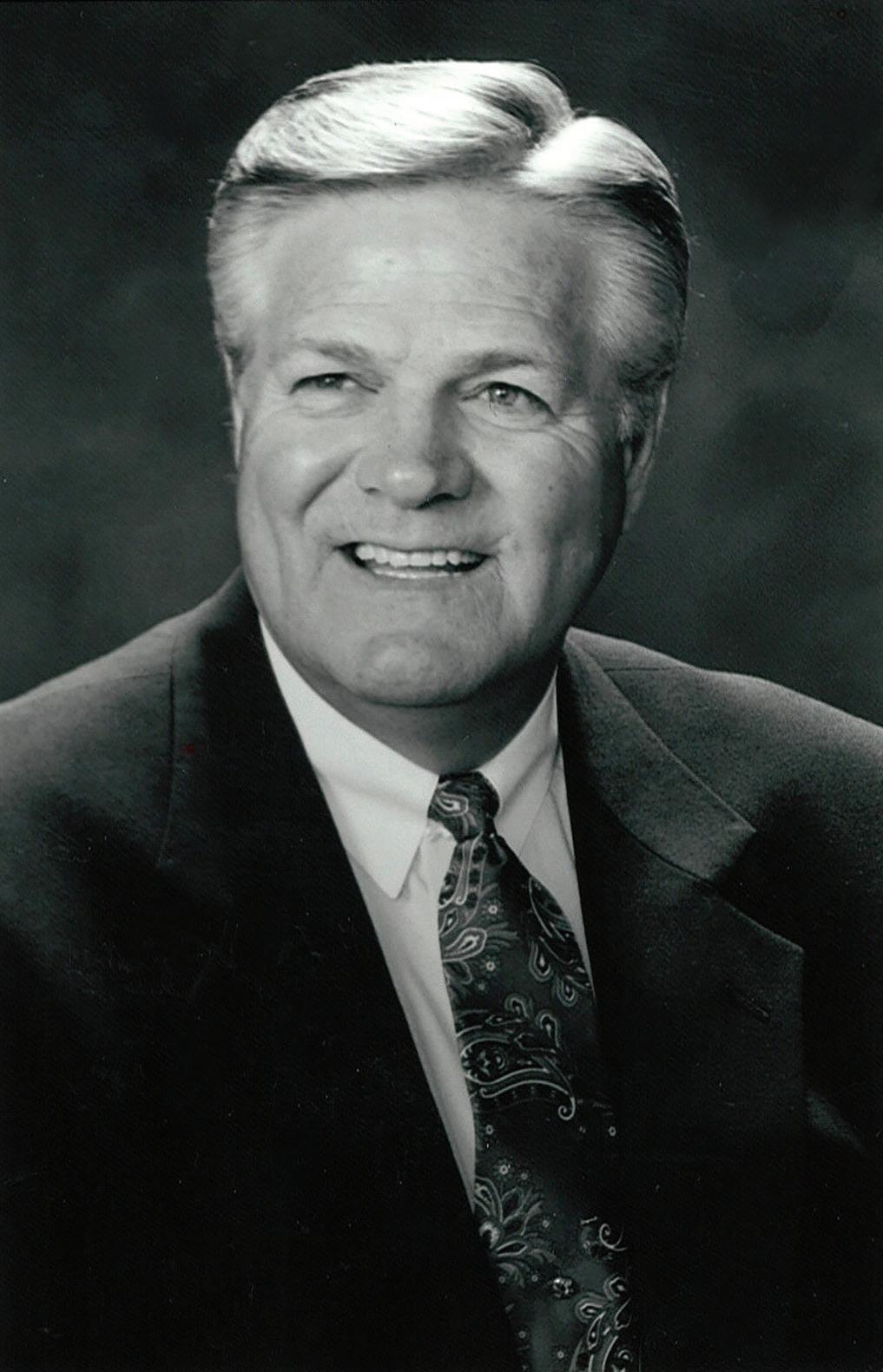

Though St. Louis, Missouri, native John Gibbs is perhaps best remembered for his 60-year pulpit and music ministry, the beloved preacher also played a significant role in developing an important denominational program. Under the guidance of Home Missions
Though St. Louis, Missouri, native John Gibbs is perhaps best remembered for his 60-year pulpit and music ministry, the beloved preacher also played a significant role in developing an important denominational program. Under the guidance of Home Missions
Director Roy Thomas, Gibbs developed and promoted the Church Extension Loan Fund (CELF), which invited investors from within the denomination to enable the department to lend money to new churches at an affordable rate of interest while providing those investors a fair return. Today, CELF has grown tremendously and continues to help congregations purchase property, construct buildings, or remodel facilities. What a blessing!
Why not establish your own legacy fund with an endowment for North American Ministries through FWB Foundation?
Director Roy Thomas, Gibbs developed and promoted the Church Extension Loan Fund (CELF), which invited investors from within the denomination to enable the department to lend money to churches at an affordable rate of interest while providing those investors a fair return. Today, CELF has grown tremendously and continues to help congregations purchase property, construct buildings, or remodel facilities. What a blessing!
www.fwbgifts.com | 877-336-7575
Why not establish your own legacy fund with an endowment North American Ministries through FWB Foundation?
BY DAVID BROWN, CPA
The Bible has much to say about how to be a good citizen. In the Old Testament, the references are mostly about how to be a good citizen in the Kingdom of Israel and Judah, except for the period of captivity. Daniel has a great deal to say about how to behave in an ungodly culture.
In the New Testament, the references largely regard being a citizen in a secular, or even pagan, government. Three writers in the New Testament refer to the topic of citizenship. Paul writes about citizenship in Romans, Titus, and 1 Timothy. Peter covers the topic in 1 Peter, and the writer of Hebrews also gives instruction.
Perhaps the most-cited passage regarding citizenship is found in Romans 13 where Paul taught even secular leaders are instituted by God, and we should submit to their authority, pay taxes, and honor and respect them.
The coming presidential election will be my 12th participation as a voter. Over the previous eleven, I was happy with six of the leaders we chose and not so happy with five. However, regardless of whether my choice was elected or not, he was the President, and I owed him the honor and respect Paul instructed.
“But Paul just didn’t understand how bad some of our presidents would be,” some might argue.

Most Bible scholars believe the epistle to the Romans was written between 54 and 59 AD. Nero was the Roman Emperor during that period. He was one of the most famous and notorious Roman Emperors. Even today, controversy swirls about what he did and did not do. Most historians describe him as tyrannical and self-indulgent. Roman historians from his era viewed him as compulsive and corrupt. Nero had his own mother murdered, and many still believe he was to blame for the fire that destroyed much of Rome in 64 AD. What we know for sure is that, after the fire, he blamed the Christians and tortured and killed many.
Throughout the history of the United States, we have had bad presidents, but I don’t think anyone would argue the worst of U.S. presidents was worse than Nero. Therefore, if Paul wrote this book to Roman Christians, instructing them to honor, respect, and submit to the authority of Nero, we need to do the same regardless of our opinion about the election outcome.
About the Columnist: David Brown is director of Free Will Baptist Foundation. Visit www. fwbgifts.com to learn more about the grants program.

BY ERIC K. THOMSEN
The sun was just setting across the panoramic White Mountains when we pulled into the drive of the Ridge Church. Bathed in a deep golden glow, the stately church and its iconic bell tower looked like a souvenir postcard or the cover of a travel magazine. Wildflowers swayed serenely in the tall summer grass as a gentle breeze stirred the stately fir trees.
“This is better than I ever imagined!”
I smiled at my mother’s words and glanced over at her. She stood entranced by the scene before her, hands clasped in front of her, a broad smile playing across her face.
At age 83, she had finally determined to take her “dream trip” to visit historic Free Will Baptist sites in New England. Smiling at her enraptured expression, I thought to myself: “The Ridge Church was definitely the right place to start!”
The Ridge Church started in a New Hampshire farmhouse in 1780, when seven men and women signed a church covenant and 13 articles of faith written by Elder Benjamin Randall. The congregation quickly outgrew the farmhouse and moved into the Meeting House in nearby New Durham, where it remained nearly four decades. However, in September 1818, a decade after Randall died, plans were finalized on a new building to be constructed on the ridge above New Durham. The work was completed
the following summer, and two centuries later, the original building remains standing, though the church has experienced multiple changes: chimneys and a bell tower added, decorative metal sheets applied to the walls and ceiling, and electric lights to replace the oil lamps in the chandelier.
As might be expected, the historic structure is listed on the National Registry of Historic Places and is such a vital part of the town history it appears in the Town Seal.
In recent decades, Master’s Men has been heavily involved in the renovation and maintenance of the Ridge Church. Volunteers have repaired and replaced the roof, painted both the interior and exterior (including pews), secured the weak foundation, removed sagging chimneys, and replaced windowpanes, among dozens of other smaller projects.
The result of all their hard work? The enraptured look on my mother’s face.



Over the next five days, my mother and I visited a half dozen Free Will Baptist historical sites, but the Ridge Church was (by far) her favorite. We returned three times. She explored to her heart’s content, played the piano, and took enough pictures to fill an album. In the full light of day, however, we saw things that had not been as noticeable in twilight, details where renovation remains a little ragged around the edges. So, mom decided to get involved.
After our trip, I sat down with Master’s Men Director Ken Akers to ask what she could do to help. After some discussion, mom settled on paying for new carpet. It’s not a huge or expensive project, but it is a small way she can take part in preserving the Ridge Church (honoring my father’s memory in the process).
What about you? Would you or your church adopt and fund one or more of these small projects to help complete and maintain the restoration of this amazing historical site? Let’s work together to help future generations connect to their Free Will Baptist heritage. Maybe they will have their own magical moment during sunset on the Ridge.

Window glazing
Bell tower siding
Bell restoration
Storage shed
Granite foundation


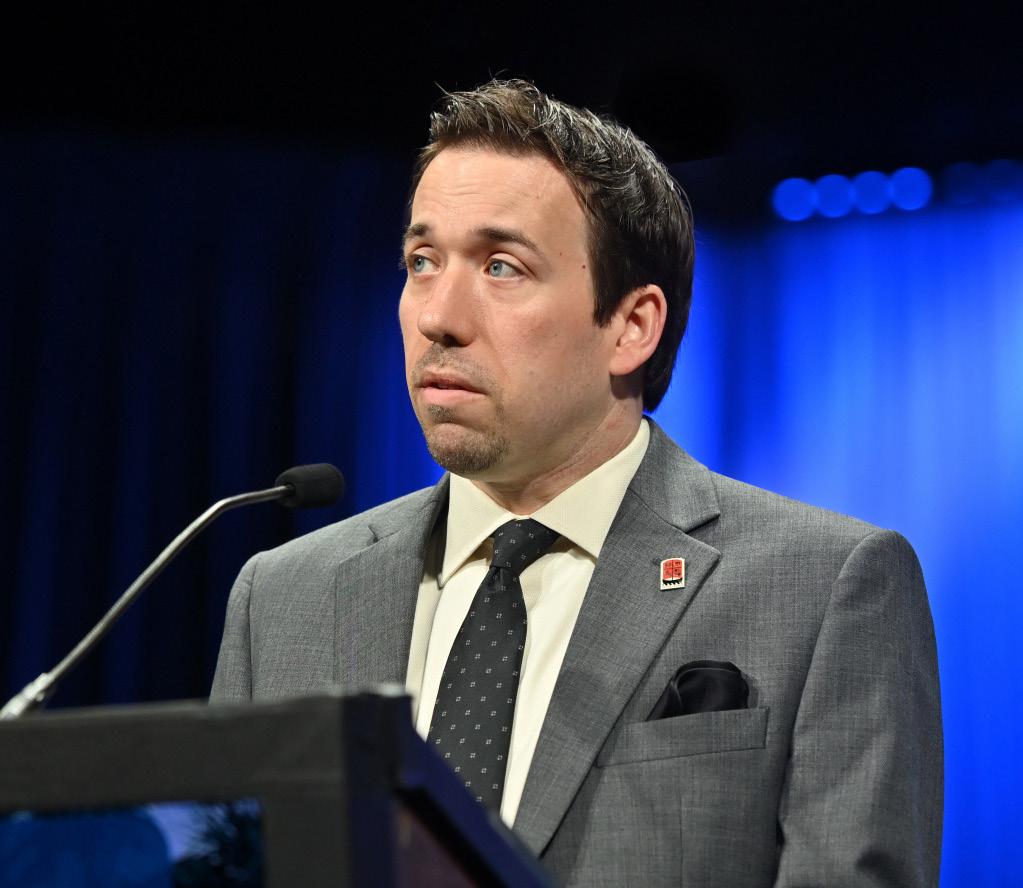
For the first time in two decades, the denomination has a new General Officer. In 2023, delegates elected W. Jackson Watts to follow William Smith as assistant moderator. Jackson has been the pastor of Grace FWB Church in Arnold, Missouri, since August 2011, after previously ministering in North Carolina. ONE Magazine recently interviewed Jackson to learn more about him.
What would people be most surprised to learn about you?
I grew up on a farm and spent many of my formative years outdoors in the woods. While that’s quite different from the life I lead now, I still have a deep respect for and occasional fascination with agriculture.
I also have an eclectic educational background. Someone recently told me perhaps no one in the denomination has such a unique array of educational stops. I attended public school from kindergarten through high school. Then I attended our denominational school for undergrad (English, Biblical Studies, Pastoral Ministry), a Southern Baptist seminary for my first masters (Apologetics), a mainline university divinity school for my second masters (Systematic Theology), and then a confessional Lutheran school for my Ph.D. (Theology & Culture). It has been an interesting ride!
Tell me briefly about your early life.
My older brother and I were raised in a Bible-believing family in the Pee Dee region of South Carolina, 70 miles from the Atlantic Ocean. The part of town where I grew up was known as Puddin’ Swamp. (Yes, no “g” on Puddin’). My father was a third-generation farmer, my mother a dental assistant. Most importantly, my parents encouraged the Bible and church life. We started out in the conservative Methodist church of my father’s youth then moved to my mom’s
home church: Horse Branch FWB Church in Turbeville. I was deeply influenced by pastors and youth pastors James Earl Raper, Todd Parrish, Charley Carmack, Jonathan Kell, and Jakey Creech. They made Scripture, ministry, and the Christian life make sense.
Who were other early influences on your life?
Parents always have great influence on their children. But my grandparents (on both sides), especially my grandfathers, really shaped the way I experienced the world and saw myself. My last grandparent (Grandma Kay) only passed in 2021, so I had her with me well into my 30s. Her way of life looms large in my mind and heart. I must return to my primary youth pastor, Jonathan Kell, who was also quite influential. While he was very different from me in personality and temperament, God used him mightily to influence my life.
Can you share your conversion experience?
I don’t remember a specific “come-to-Jesus” moment. However, I remember as early as four to six years of age believing in Jesus, knowing I needed Him to deal with my sin, and trusting in Him as the way to eternal life. Some will chuckle, but I recall praying an “extra assurance prayer” when around eight, thinking I needed to be able to point to a moment when I committed to the Lord. However, I am confident my conversion occurred at the younger age.
How did you meet your wife Mckensie? And how would you describe her?
I heard from Mckensie’s pastor about a singles outing at his church, and he invited me to come. I got the info from their singles group coordinator and planned to go. The church where I served, coincidentally where Eddie Moody pastored at the time, was hosting a (somewhat disastrous) Valentine’s Day banquet. Dr. Moody knew I was planning to attend the singles event, so he told me, “Go ahead; you can’t do anything to fix this mess!”
I was the only single not from the other church who attended the singles outing. Color me embarrassed! However, I met Mckensie at Applebee’s in Fuquay-Varina, North Carolina, among a group of young adults from her church. I got her email address from the group email chain and asked her out via email. You know, the old-fashioned way. Not a dating app. The rest is history.
Mckensie is a down-to-earth, conscientious person. She is a wonderful mother and capable in teaching and managing children. She handles herself well in all kinds of social situations, has a big smile, and an even bigger heart. She is a great cook, and I’m not the only one who thinks so. It’s amazing how long it took me to find her, but all that matters is I did.
As you look back over your life, how did God prepare you for this position?
Learning the Scriptures so well prior to college is perhaps the greatest head start I could imagine for someone with teaching the Bible at the heart of his calling. I credit my mother, CTS coaches, and other church leaders/teachers for that. Also, in my church and community life, we interacted with many different people — old, young, white, Black, Hispanic, etc. I think that fosters a comfort level with different kinds of people, and perhaps even helps you love them better.
Jesus being glorified in our communities and in the nations is the ultimate end.
My four years at Welch College were profound in many ways, but especially in cultivating relationships, discipline, and learning to recover after mistakes. My four years working alongside Eddie Moody and Bryan Hughes prior to being a pastor myself was helpful in so many respects. Strangely, being single for so long also helped a lot. The flexibility of my schedule allowed opportunity for social engagement with many people in many situations.
Serving as a board member and officer at the state level for
over a decade has given me experience with meetings and situations that mirror, on a slightly smaller scale, the issues that arise at the national level.
What excites you most about serving as assistant moderator?
The most exciting aspect is serving on the Executive Committee, which includes the officers, but also includes several other wonderful men from different regions. I knew many of them before coming aboard, but this opportunity helps me get to know them better and work with them in promoting the healthy operation of our General Board and the denomination. I’m not shy to speak, but being in the room with this group makes listening interesting and helpful.
From your perspective, describe the job of assistant moderator.
Three things: 1) support the moderator in every way I can as it serves the interests of the meeting or situation; 2) keep eyes and ears open for things that might go overlooked or awry in a meeting, and 3) support the vision of the executive director.
For what one thing are you most grateful?
Jesus loves me; this I know.
What would you say to Free Will Baptists?
I have been thinking a great deal about what Benjamin Franklin said after he finished signing the Declaration of Independence. “Gentlemen, we must now all hang together, or we shall most assuredly all hang separately.” As a denomination, we are going to have to decide if we believe “better together” is a biblical mandate, or just a slogan. If we believe the former, it raises the stakes on what we are willing to do together to promote healthy churches, evangelism, church planting, global missions, family disciples, and the other two or three things that really matter most.
I’m not talking about denominational preservation only. That’s a means, not an end. Jesus being glorified in our communities and in the nations is the ultimate end. If we keep the end in view and realize "better together" is an essential, mandatory strategy toward that end, then I predict we’ll be just fine.
For those struggling, remember discouragement and fear may be Satan’s most powerful tools to keep us from fulfilling the Great Commission. Decide today if you’re going to give him the satisfaction, or if you’ll lean into Jesus, keep waging war on the flesh, and love your neighbors.
BY EDDIE MOODY
If my people, which are called by my name, shall humble themselves, and pray, and seek my face, and turn from their wicked ways; then will I hear from heaven, and will forgive their sin, and will heal their land. — 2 Chronicles 7:14

As we approach the 2024 election, we encourage all Free Will Baptists to make time to pray and be lights to our communities. Then, after the election, we ask the denomination to set aside Thursday, November 7, to pray for our communities and neighbors.
WHY should we pray for our neighbors?
Ultimately, because the Lord tells us to—and not just for our neighbors but for everyone (1 Timothy 2:1-2). We know He wants us to pray for them because He tells us to love them and reach them with the gospel (Matthew 28:18-20).
HOW can we pray for our neighbors?
We have partnered with a ministry named BLESS to provide a free, practical prayer resource for our denomination. BLESS stands for: B egin with prayer, L isten, E at (fellowship), S erve, and share your Story. By going to nafwb.org/bless you can register your church or yourself individually to pray for your neighbors. It takes less than five minutes to complete registration.
Each day, you will receive a list of five neighbors to pray for via email or the BLESS app. You will also be able to
label their homes with the map that accompanies your account. We can record these prayers for our neighbors at nafwb.org/bless. As of today, Free Will Baptists have recorded 34,707 prayers for their neighbors using BLESS. It is our goal to reach 100,000 prayers by the end of the day November 7.
can we pray for our neighbors?
We encourage you to pray for the spiritual, physical, and psychological wellbeing of those in your community. As you pray for your neighbors, ask God to give you opportunities to talk with them. As you walk, work in the yard, or meet by your mailboxes, ask neighbors how they are doing and listen carefully to their replies. If they share a concern, commit to praying for that need, specifically and by name. Look for opportunities to eat out or grab coffee together. Somehow, food seems to break down barriers.
As we listen to our neighbors, may we identify ways to serve them, like watching their dog while they are away or getting their mail for them. Listen to their stories and look for opportunities to share your own — what Christ has done for you and how you came to know Him. Ultimately, ask God to give you an opportunity to present the gospel message and to give you strength to speak without hesitation when He opens the doors.
Begin now. If you aren’t already doing so, please begin praying for your neighbors today and make a special emphasis on praying for the upcoming election. Also, consider praying for your neighbors around the church and sending them a note to share that you are praying for

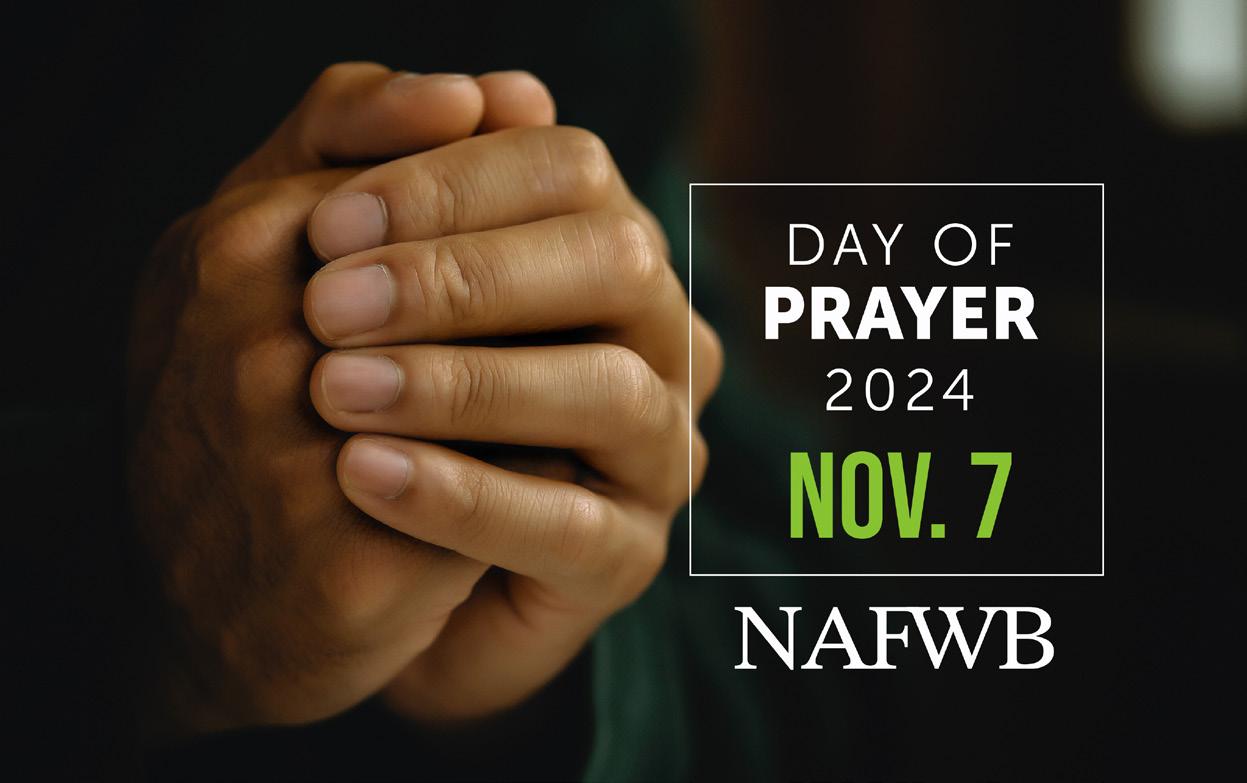

Antioch, TN — The Executive Office recently launched a new program to help churches through extended pastoral changes, according to Executive Director Eddie Moody.
“Free Will Baptists are not immune to the shortage of pastors in North America,” Moody notes. “We have launched The Shepherding Initiative to deal specifically with the challenges created by the lack of pastors.”
The Shepherding Initiative builds on the foundation of the pastor placement program launched two years ago and led by Dr. Tim York. York works confidentially with pastors and church leadership to help them identify one another. Churches facing a pastoral change are encouraged to watch the Better Together Podcast (nafwb.org/podcast) featuring Pastor Barry Long to understand how this pastor placement program works.
Despite these efforts, the number of available pastoral candidates does not meet the number of church vacancies, making it necessary for the program to work with churches until they settle on a pastor. “That’s why we began a shepherding approach,” continues Moody. “A coach/mentor works with a leader within the church each week to help that individual continue day-to-day operations of the church, and we provide additional resources to the church to help it continue ministering effectively until they find a pastor. This not only keeps the church from losing ground in the interim, but it also sets the stage for a smooth transition for the new pastor.”
Any church interested in The Shepherding Initiative should email the Executive Office at questions@nafwb.org with “The Shepherding Initiative” in the subject line. For more information about the program, visit nafwb.org/shepherding
Antioch, TN — The Refresh Pastoral Counseling Program of the National Association has reached an important milestone, according to Executive Director Eddie Moody.
More than 1,200 sessions have been provided to pastors or members of their families since 2022. Moody, a licensed clinical mental health counselor supervisor himself, expresses his gratitude for the program and credits Tom Jones, licensed professional counselor and former Free Will Baptist church planter, as a key to the success of the program. “Tom has been a workhorse,” Moody notes, “conducting nearly a thousand counseling sessions.”
The program was born from tragedy. Dr. Moody recalls early days in the Executive Office when he was overwhelmed by the needs of many pastors and pastoral families. He recounts, “While at the airport one Saturday afternoon, waiting to fly out to speak at a church, I spoke with a pastor concerning the urgent needs of his wife. I had to cut short the conversation to board the plane.”
Later, that pastor’s wife took her own life. Dr. Moody recalls wanting to start a pastoral counseling program but lacking the funding. He approached Dr. David Crowe, director of North American Ministries, about the problem. Crowe assured Moody his department would help. After the program began, IM, Inc.; Richland Ave Financial; FWB Foundation;
the Missouri State Association; and other agencies joined the effort.
The counseling program is used to address difficulties pastors are experiencing. “We are here to help with big or small problems,” Dr. Moody says. “We love our pastors, and we want them to know they are not alone in the ministry.”
One counseling recipient observed, “I very likely wouldn’t be in the ministry if it weren’t for the Refresh Counseling Program.” Another noted, “During a very broken time in my life this ministry provided sound biblical direction.” Still another recipient noted the program “was a critical tool for me as a pastor to work through my depression and anxiety in a healthy way.”
Listen to the Better Together Podcast to hear Pastor Sherman Branch’s powerful testimony describing how the program helped him after the death of his wife, and what he experienced as a participant.
The counseling program currently relies upon eight helping professionals to meet the variety of needs faced by pastors and their families. If you or someone you know would like to participate, email questions@nafwb.org with Counseling in the subject line. You will be contacted for more details. Find additional resources: nafwb.org.
Monday, December 9
3:00 Registration Opens
5:30 Supper
7:00 The Solo Pastor, Dr. Gary McIntosh
Tuesday, December 10
8:00 Breakfast
9:00 How Your Church Can Minister to Your Community, Daryl Crouch
10:00 The Mediterranean Sea Rules Robert J. Morgan
10:50 Break
11:10 Dreams, Dangers, Directions: Insights on Vision to Use Today
Dr. Gary McIntosh
12:00 Lunch
1:30 Confronting Isolation: Panel Discussion
2:30 Making Associations Work, Stan Bunch
5:30 Supper
7:00 Growing God’s Church
Dr. Gary McIntosh
The 2024 Leadership Conference will return to the Sonesta Nashville Airport hotel December 9-10. Gary McIntosh, writer, speaker, and professor will be the featured speaker for general sessions. Author of 22 books, McIntosh is a professor of Christian Ministry and Leadership at Talbot School of Theology, Biola University, where he teaches pastoral theology and North American missiology. Gary has analyzed over 1,200 churches from 90-plus denominations in the United States, Canada, Australia, and Southeast Asia.
For fun, Gary enjoys fishing with Carol, his wife of 55 years (but admits she always catches the largest fish). The couple has two children, eight grandchildren, and two great grandsons.
On Tuesday, featured seminars along with a panel discussion will offer practical encouragement and instruction for attendees. They will enjoy fellowship during meals and free time throughout the conference. Find regular conference updates at www.nafwb.org/leader
BY EDDIE MOODY
On May 9, 2022, Salton Zagsaw was having a bad day. He was running late to work and hadn’t had his coffee. As he rounded a curve, his coffee turned over. He looked down and boom! He rammed into the rear end of a parked vintage 1974 Chevy truck — just the kind he and his friends all wanted.
Sal grew up in Fresno, California, and as a youth got into all kinds of trouble. But after moving to Selma, California, the previous year, Sal thought his life was getting on track. He had a family and a job, and he was making progress. This one event could turn the neighborhood against him, he thought, as he nervously watched the owner of the truck approach.
Stephen Hicks and his wife were sitting at their kitchen table when they heard a loud boom. Stephen’s hearing is not what it used to be, but he knew something was wrong. He headed out to check. He found a very worried big guy whose truck was greatly damaged, and who had still not even had his coffee yet.
“Are you okay?” Stephen asked.
Sal was shocked. In his experience, these encounters involved yelling, cursing, and even fighting. Instead, Stephen told Sal, “Don’t worry about it,” and tried to calm the young man down. He even told Sal to head to work, and they would sort it out with Sal’s insurance company later. Sal went to work and told people about Stephen’s reaction. They couldn’t believe it.
If Sal had run into Stephen’s truck in 1981, it probably would have been different. After his second wife left him with their two kids, Stephen’s life was in shambles. But Stephen’s neighbor — one with whom he previously smoked pot — found Christ. Stephen longed for the peace she had found. Sometime later, Stephen found Christ at Grace Church in Selma. He has served at Grace ever since. God changed Stephen, and that was what Sal saw on that bad day.
Sal worried about the truck until his insurance company told him everything had been settled. Since he lived only four houses down, he started spending time with Stephen. Stephen helped Sal repair his own truck and started having spiritual conversations with him — the first in Sal’s lifetime.

“What do you think about Jesus?” Stephen asked.
If it had been anyone else, Sal would not have been interested. Before long, Sal found himself attending Grace Church, too. One day, after talking to Pastor Stan Roam in the foyer following church, the two of them went to the altar where Sal asked Christ into his life. A year later, Sal’s wife accepted Christ, and the couple and their family are growing in the Lord.
Stephen is Sal’s best friend and mentor. They talk about five hours each week. On February 25, Sal preached a sermon at Grace Church, and many people attended who had never been to church before. Sal works with the youth, and he and his wife are exploring how God would have them serve in the future.
When Sal first shared his story, I wondered, “What if Stephen had come out of the house angry?” I was convicted about how irritants in my life could be handled differently. What a reminder that God is always working. With God, what begins as a bad day can truly become a great day when we yield to Him.
Hear Sal and Stephen’s story on the Better Together Podcast.

Eddie Moody Executive Director, National Association of Free Will Baptists

